



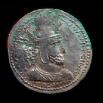
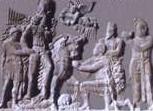

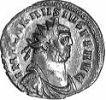










| Country | Leader | From | To | |
| Roman Empire | Septimius Severus (145-211) | Apr. 14, 193 | Feb. 4, 211 |  |







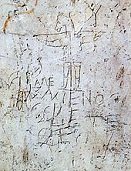
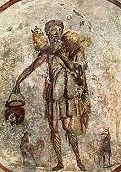
200 This year is the Last Year of the Apostolic Age of the Church. Roman consuls: Tiberius Claudius Severus Proculus and Gaius Auphidius Victorinus. On Feb. 2 emperor (since 191) Chuai (b. ?) dies after rejecting the divine dreams of his consort Jingu (169-269) about a promised land over the sea, and she becomes regent and de facto emperor for her infant son Hondawake (Homutawake) (Ojin) (200-310), who becomes Japanese Yamato emperor #15 (until 310); Jingu goes on to conquer the promised land of Korea over a 3-year period; in 1881 she becomes first woman featured on a Japanese bank note - picture her clothes, only her clothes? Emperor Septimius Severus renews Augustus' 22 B.C.E. ban on aristocratic women fighting in the arena. Early in this cent. the East Germans (Bastarnae, Burgundians, Goths, Gepids, Heruli or Heruls, Rugians, Sciri) begin migrating from Scandinavia towards the Black Sea, arriving by 214, afterwards dividing into Visigoth (Lat. "good or noble Goth") (West Goth) and Ostrogoth (Lat. "splendid Goth") (East Goth) groups; the Goths allegedly left Scandinavia in three ships, and the last ship contained the Gepids, whose name means slow? - you go thataway, we'll go thisaway? The ancient city of Babylon is deserted by now - what Bible passage predicted that? Roman soldiers are permitted by Emperor Septimius Severus to marry. In this cent. Mug Nuadaf's son Ailill Aulom (Ollamh) (Olum) becomes king of S Ireland, marrying Sadb Ingen Chuinn, daughter of Conn of the Hundred Battles, and dividing his kingdom between his sons Eogan Mor (Éogan Mór) (founder of the Eoganachta Dynasty of Munster), Cormac Cas (founder of the Dalcassians), and Cian, while his foster son (by Sadb) Lugaid Mac Con becomes Ard Ri (high king) of Ireland; Eogan's son is Fiachu Mullethan (Fiachu Fer Da Liach). In this cent. the Kingdom of Axum in Ethiopia becomes predominantly Christian. In this cent. the Bantu-speaking South African kingdom of Thulamela ("place of birth") along the banks of the Limpopo River is founded. In this cent. the Mende people move into S Sierra Leone. In this cent. the Aramaic language of Syriac (based on the eastern dialect of upper Mesopotamia) begins to be used in Syria (until the 13th cent.). About this time Christian saint Clement of Alexandria (Titus Flavius Clemens) (150-215) writes the soundbyte: "There are those who have determined not only the year of our Lord's birth, but also the day; and they say that it took place in the 28th year of Augustus, and in the 25th day of [the Egyptian month] Pachon [May 20]... Further, others say that He was born on the 24th or 25th of Pharmuthi [April 20 or 21]"; about the same time Smyrna-born Christian bishop of Lyon #2 St. Irenaeus (Gr. "peacemaker") of Lyon (130-202) writes that Christ was born on Dec. 25. In this cent. Caesaragusta (Saragossa) in NE Spain is made an episcopal see. In this cent. Artemidorus Daldaianus (of Daldis) (Ephesius) flourishes, leaving Oneirocritica (Oneirokritikon) (Gr. "The Interpretation of Dreams") (5 vols.), becoming the earliest known Greek work on the subject. Architecture: Roman emperor Septimius Severus builds the Hippodrome during the rebuilding of the town of Byzantium, and bans female combat as an affront to military dignity - especially if there's frontal nudity involved? In this cent. the Mars Gate triumphal arch is built on the N side of Civitas Remorum (Reims) (Rheims), a city built on the site of Durocotorum, capital of the Remi tribe of Gallic Celts. About this time the skyscraper Ghumdan Palace is built in Sana'a, Yemen. Inventions: About this time Greek physician Galen (131-201) invents Cold Cream, containing olive oil, beeswax, rose petals, and water. About this time the Roman army invents the Roman Army Knife, made of silver with iron blades, featuring spoon, fork, spike, spatula, and toothpick. About this cent. Jewish physician Asaf ha Jehudi (Asaph the Jew) leaves a ms. (oldest known medical work in Hebrew) teaching that the blood circulates through the arteries and veins, which is lost until modern times - he was afraid they'd think he had hairy palms? In this cent. the organ becomes a part of Catholic churches in Europe - we're only human? In this cent. raw fish Sushi is invented in Japan. Art: About this time the Alexamenos graffito on a plaster wall in a room near the Palatine Hill of Rome, drawn by a pagan Roman soldier mocks a fellow Christian soldier, depicting a crucified donkey; the early known pictorial depiction of the crucifixion of Jesus? Nonfiction: About this time the Greek Muratorian Canon, the oldest list of approved books in the New Testament is written in Rome - watch those periblepsises and homoeoteleutons? About this time Roman-born bishop St. Hippolytus of Rome (170-235) writes Philosophoumena (Refutation of All Heresies), and Treatise on Christ and Antichrist (204?), a commentary on the Book of Daniel that feeds Millennium Fever for cents., using the dimensions of the Ark of the Covenant to set the date for the Second Coming of Christ as the year 500, exactly 6K years after the creation of Adam, containing the soundbyte: "For the first advent of our Lord in the flesh, when he was born in Bethlehem, was December 25th, Wednesday, while Augustus was in his forty-second year, but from Adam, five thousand and five hundred years. He suffered in the thirty-third year, March 25th, Friday, the eighteenth year of Tiberius Caesar, while Rufus and Roubellion were Consuls"; also Discourse to the Greeks Concerning Hades - who sucks worse, Minos, Rhadamanthus, or Aeacus? Approx. date for a number of apocryphal Christian works by Leucius Charinus, incl. The Acts of John, claiming that he destroyed the Temple of Artemis in Ephesus. The Tannaitic Rabbinic School of Palestine ends, and the Amoraic (Aramaic "those who say") Period begins (ends 500), continuing to produce the Midrashim (Biblical commentary), incl. the Mekhilta (on Exodus) of Rabbi Ishmael, the Sifra (on Leviticus); the Sifre (on Numbers and Deut.), the Genesis Rabba, and the Pesiqta de Rab Kahana (on the festivals and special Sabbaths); late in this cent. the yeshivas of Sura and Pumbedita are established in Babylon by Judah bar Ezekiel (220-99) et al., going on to produce the Babylonian Talmud; In this cent. Israeli Jews begin cranking out Merkabah (Merkavah) (Chariot) Mysticism lit., based on visions of Ezekiel's Chariot/Throne, which they believe allow the soul to travel to higher dimensions. Approximate date of the writing of the Sepher Yetzirah (Book of Formation), the earliest surviving rabbinical Qabbalistic text; the mystical commentary on the Pentateuch called the Zohar is begun in this cent., and becomes a principal source of the Qabbala (Kabbala) (Cabala) (ends 13th cent.). Ogham Script begins to be used in Ireland (ends 6th cent. C.E.). About this time Vatsyayana writes the Kama Sutra (Sans. "thread of desire"), a collection of erotic texts composed since 400 B.C.E., becoming the #1 Sanskrit work on human sexual behavior esp. sexual intercourse; Kama is the Hindu god of love, who carries a bow and sugar-tipped arrows - hey, how would you like to go out for dinner and a little tax talk? Music: Plainchant originates in Europe in this cent., becoming the first revival of musical notation since the ancient Greek system was lost, with four lines to a staff, and note shapes called neumes. Art: Early in this cent. the Domus Gelotiana Graffito depicts Jesus Christ as a donkey being crucified on a cross, mocking a Christian worshiper named Alexamenos; discovered on the Palatine Hill of Rome in 1857 in a house used as a boarding school (paedagogium) for imperial page boys founded after the death of emperor Caligula (d. 41) on a street that was later walled off. In this cent. the beardless Jesus the Good Shepherd is painted in the Catacomb of Calixtus in Rome on the Appian Way, which becomes the Crypt of the Popes until Pope Damasus I in 384. In this cent. the Byzantines relearn the art of Enameling with metallic oxide, which had been invented in China, come to ancient Greece, and disappeared in the 3rd cent. B.C.E. About this year a mural in Sicily's Piazza Armerina shows women at play wearing 2-piece bikinis? About this time Greek rhetorician-gastronome Athenaeus of Naucratis flourishes, leaving Deipnosophistae (Lat. "dinner table philosophers") (15 vols.), the oldest surviving cookbook, about a banquet at the house of Publius Livius Larensi(u)s with 24 guests, becoming the first work to describe the giving of patents by the govt., incl. a discussion about homosexuality; incl. recipes by Mithaecus, Euthydemus of Athens, Epaenetus, Glaucus of Locri, Dionysius, Erasistratus, Diocles of Carystus, Timachidas of Rhodes, Philistion of Locri, Ethydemus of Athens, Chrysippus of Tyana, Paxamus, and Harpocration of Mende; repub. in 1612 by Isaac Casaubon. Births: Christian bishop of Carthage (248-58) ("Father of the Hierarchical System") (St.) Cyprian (Lat. "from Cyprus") (Thascius Caecilius Cyprianus) (d. 258); feast day: Sept. 16. Roman emperor #45 (275-6) Marcus Claudius Tacitus (d. 276) in Interamna (Terna). Greek mathematician ("Father of Algebra") Diophantus of Alexandria (d. 284). Babylonian Jewish rabbi Judah bar Ezekiel (d. 299); disciple of Abba Arika (Rav). Japanese Yamato emperor #15 (270-310) Hondawake (Homutawake) (Ojin) (d. 310); son of emperor Chuai (-200) and Jingu. Deaths: Roman writer Lucian of Samosata (b. 125). Chinese scholar Zheng Xuan (b. 127). Japanese Yamato emperor #14 (191-200) Chuai (b. 149) on Feb. 2. Indian philosopher Kumaralabdha (b. 150).
201 The 245th Olympiad. Roman census. Donald I (-219) (Gael. "world mighty") becomes king of Scotland. The Romans under Septimius Severeus destroy the Garamantian capital city of Garama in Libya. A flood destroys the Christian church in Edessa. Roman consuls: Lucius Annius Fabianus and Marcus Nonius Arrius Mucianus. Births: Roman emperor #34 (249-51) Decius (Gaius Messius Quintus Traianus Decius) (d. 251) in Budalia (modern-day Martinci) (near Sirmium), Lower Pannonia (Serbia); first emperor from Illyricum. Deaths: Greek #1 physician (in Rome) Galen (b. 131) in Rome (d. 216?); leaves a physiological model of the human body that becomes the std. for anatomy for cents.; leaves 500+ works (10M words) written down by 20 scribes, representing half of all lit. from ancient Greece to survive to modern times; too bad, little is translated into Latin, so that only the Byzantines read it until the Muslim Abbasids (750-) tr. some of it into Arabic, and only after the fall of Constantinople to the Muslims in 1453 do Greek scholars head W with his mss., incl. Ars Medica, which tries to preserve the Greek attribution of mental properties to bodily functions; On the Passions and Errors of the Soul; De Motu Musculorum (2 vols.), which explains the difference between motor and sensory nerves, mentions muscle tone, and differentiates agonists from antagonists; That the Best Physician is Also a Philosopher, and On the Natural Faculties (De Naturalibus Facultatibus) (3 vols.), which is pub. in London in 1523 - and Vicodin is cool to pop?
202 Roman consuls: Lucius Septimius Severus Pertinax and Marcus Aurelius Severus Antoninus. The Romans pacify the Mesopotamian region. Marcus Antius Crescens Calpurnianus, former gov. of Macedonia becomes Roman gov. of Britain #34 (until 203), planning the future division of Britain into two provinces in 212. Emperor Septimius Severus visits the Roman garrison in the Libyan oasis of Ghadames. Eusebius Pamphili writes that there are Christians in the whole Thebaid of Upper Egypt as far as 800 km up the Nile Valley by this year. Deaths: Christian bishop of Lyons St. Irenaeus (b. 130) on June 28 in Lugdunum, Gaul (modern-day Lyons, France); martyred by Severus, according to St. Gregory of Tours; predicts the Second Coming of Christ in the year 500.
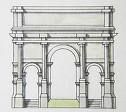
203 Roman consuls: Gaius Fulvius Plautianus Publius Septimius Geta. Gaius Valerius Pudens, former gov. of Germania Inferior becomes Roman gov. #35 of Britain (until 206), going on to build new barracks at Bainbridge fort to deal with revolts by the Brigantes. Architecture: Emperor Septimius Severus builds the Arch of Septimius Severus in Rome near the Forum N of the Palatine Hill, which survives to modern times. Births: Roman emperor #25 (218-22) Elegabalus (Heliogabalus) (Marcus Aurelius Antoninus) (Varius Avitus Bassianus) (d. 222) in Emessa, Syria; son of Sextus Varius Marcellus and Julia Soaemias (180-222).

204 The Yellow Turban Revolt in China (begun 184) is ended by the generals, who begin to fight among themselves for control. Roman consuls: Marcus Fabius Cylon Septimius Catinius Acilianus Lepidus Fulcinianinus. Births: Roman emperor #33 (244-9) Marcus Julius Severus Philippus (Philip I the Arab) (d. 249) in Philippopolis, Arabia Petraea; father of Philip II (237-49). Roman "Enneads" philosopher Plotinus (d. 270) in Lycopolis, Egypt; student of Ammonius Saccas; founder (coiner of term) of Neo-Plotinism, er, Neo-Platonism (ends 529), which reduces the Universe to the One, the Intellect, and the Soul.
205 The 246th Olympiad. Roman consuls: Marcus Aurelius Severus Antonius and Publius Septimius Geta. Rabi'a (d. 230) founds the polytheistic Kingdom of Kindah (Kindat) in C and N Arabia, with capital at Dhu-Kahilum (modern-day Qaryat al-Fau) near Yamama (500 mi. from modern-day Mecca). Nonfiction: Approximate date of the Octavius of North African Christian convert Municius Felix.
206 Numidian-born Lucius Alfenus Senecio, former gov. of syria in 200-5 becomes Roman gov. of Britain #36 (until 207), becoming the last gov. of undivided Roman Britain, finishing the reoccupation of the province and its frontiers, then going on to strike N of Hadrian's Wall against the pesky Maeatae and Caledonian Confederacy and erecting a victory monument in Benwell W of modern-day Newcastle upon Tyne. King Abgar IX of Edessa embraces the Christian faith, and makes it the official religion; the legend of King Abgar Ouchama (Ukomo) is backdated to the time of Christ as a propaganda tool? Roman consuls: Marcus Nummius Umbrius Primus Senecio Albinus and ? Fulvius Galvius Numisius Petronius Aemilianus. Births: Roman emperor #37 (251-3) Gaius Vibius Trebonianus Gallus (d. 253) in Italy; father of Volusianus (-253).

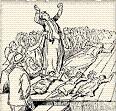
207 African Christian theologian Tertullian (155-240) breaks from the Roman Church and converts to the Montanist (New Prophecy) sect, known for its Pentecostal "holy roller" worship, becoming "the first Protestant". Roman consuls: Lucius Annius Maximus and Lucius Septimius Aprus.



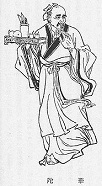

208 Goths begin to be incorporated into the Roman army - there goes the neighborhood? Vologases V dies, and his son Vologases VI (-228) becomes king of Parthia (until 228); meanwhile younger son Artabanus (Ardavan) IV (V) (-224) starts a civil war (ends 224). After British gov. Lucius Alfenus Senecio requests reinforcements, complaining about barbarians overruning the land, taking booty and causing destruction, emperor Septimius Severus arrives in person with his youngest son Publius Septimius Geta, and invades Caledonia (Scotland), restoring Roman military supremacy in N England; he withdraws from the Antonine Wall again to Hadrian's Wall, rebuilding it with stone and fixing it as the final frontier with the pick-a-fight Picts (finished 211). To stop his southern expansion, Chinese warlords Sun Quan of Wu (182-252) and Liu Bei of Shu (161-223) form a coalition and lead their 25K-50K troops against the 220K-300K troops of Cao Cao of Wei (155-220) at the Battle of Red Cliffs NW of modern-day Chibi (N of Wulin), Hubei, taking advantage of the lack of acclimatization of the northern troops, who suffer a plague, then firing their chained-together ships, burning or drowning most them and defeating Cao Cao. Roman consuls: Marcus Aurelius Severus Antoninus and Publius Septimius Geta. Births: Roman emperor #26 (222-35) Alexander Severus (Maurcus Aurelius Severus Alexander) (Marcus Julius Gessius Bassianus Alexianus) (d. 235) on Oct. 1 in Arca Caesarea, Syria Phoenicia (modern-day Akkar, Lebanon); son of Marcus Julius Gessius Marcianus and Julia Avita Mamaea (181-235) (2nd daughter of Julius Maesa). Deaths: Chinese physician Hua Tuo (b. 140); dies after becoming the first in China to use anesthesia during surgery (wine and cannabis), leaving the first written record of tea drinking, and the Exercise of the Five Animals (Wu-Chin-Hsi) (tiger, deer, bear, ape, crane).

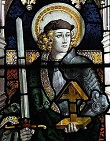
209 The 247th Olympiad. On June 22 St. Alban, a former pagan Roman soldier in Britain is beheaded in Verulamium (modern-day St. Albans), becoming the first British (English) Christian martyr. Caracalla's younger brother Publius Septimius Geta (189-211) becomes his colleague. Roman consuls: ? Pompeianus and ? Avitus.
210 The Maeatae confederation of Celtic tribes between Hadrian's Wall and the Antonine Wall in Scotland, with a hill fort on the Allan Water (tributary of the Forth River) begin a revolt against the Romans, causing emperor Septimius Severus to lead his troops against them. Vasudeva I dies, and Kanishka II (-230) becomes king of Kushan in N India (until 230). Roman consuls: Manius Acilius Faustinus and Aulus Triarius Rufinus.

211 On Feb. 4 Roman emperor (since Apr. 14, 193) Septimius Severus (b. 145) dies in Eboracum (York) in Britain after doing a great job of increasing the influence of lawyers in the Roman admin., and is succeeded by his eldest son and Augustus Caracalla (Caracallus) (Marcus Aurelius Severus Antoninus Augustus) (188-217) (nicknamed for the long Gallic cloak he wears) as Roman emperor #22 (until 217), beginning "six years under the Gallic cloak"; Severus' dying words to his sons: "Enrich the soldiers, despise everyone else"; upon his accession Caracalla gets his younger brother Geta (b. 189) elevated to Roman co-emperor #23, then gets him killed on Dec. 26, along with the jurist Papinian and 20K of his followers, and increases soldiers' pay, issuing a new coin, the Antoninianus, with a face value of two denarii but a weight of only 1-2/3 denarii to pay the difference; before leaving Britain to press his claim to the throne, Caracalla divides Britannia into Britannia Inferior (S) and Britannia Superior (N), each with its own half-pint Roman gov. Roman consuls: ? Terentius Gentianus and ? Bassus. Architecture: The Arch of Triumph in Palmyra is erected by Roman emperor Septimius Severus; destroyed by ISIS in 2015. Deaths: Roman emperor #21 (193-211) Septimius Severus (b. 193) on Feb. 4 in Eboracum, Britannia (modern-day York, England). Roman emperor #23 (211) Geta (b. 189).

212 The Edict of Caracalla (Constitutio Antoniniana) extends Roman citizenship to all free men in the Roman Empire (except the Egyptians and other tramps, thieves and undesirables) in an effort to get more inheritance taxes. Roman consuls: Gaius Julius Asperius and Gaius Julius Galerius Asperus. Architecture: Caracalla begins the regal Baths of Caracalla (Thermae Antoninianae) SE of the Aventine (southernmost) Hill, SW of the Appian Way. Deaths: Roman physician Quintus Sammonicus Serenus (b. ?) in Dec.; killed at a banquet by Emperor Caracalla; leaves the medical poem De Medicina Praecepta Saluberrima (Liber Medicinalis), containing the Abracadabra (Heb. "It came to pass as it was spoken") cure for fever and ague.
213 The 248th Olympiad. Caracalla summons King Abgar IX of Edessa and his sons to Rome and murders them - I'm not a mass murderer I'm an anthropologist? The Alamanni (Alemanni) ("all men") (named after Lake Leman?), a splinter group of Suevi tribes on < a href="http://home.t-online.de/home/Bernd.Hummel/histeng.htm">horseback who inhabit the region between the Main and Danube Rivers break through the Roman limes and unsuccessfully assault the Romans in S Germany between the Elbe and Danube Rivers, ending up with the territory of Swabia (Alamannia) (Alemannia) in SW Bavaria N of Lake Constance, home of the Black Forest, the Swabian Jura Mts. and the Upper Danube Valley. Aurelia Severa is buried alive for violating her oath of chastity as a vestal virgin (they must serve 30 years with no sex and the penalty is quite stiff?) - sometimes all I need is the air that I breathe and to love you, and I won't even go near a golf cart? Roman consuls: Marcus Aurelius Severus Antoninus and Decimus Celius Calvinus Balbinus. Births: Greek philosopher-rhetorician (Old School Platonist) (chief advisor of Queen Zenobia)Cassius Longinus (d. 273) in Emesa, Syria.
214 Caracalla declares Edessa(AKA Antiochia on the Callirhoe) in Upper Mesopotamia a Roman colony, and conducts his Parthian compaigns from it, kicking Goth butt on the lower Danube. Roman consuls: Lucius Valerius Messala Apollinarius and Gajus Octavius Appius Suetrius Sabinus. Births: Roman emperor #42 (268-70) Claudius II (Marcus Aurelius Valerius Claudius II Gothicus) (d. 270) in Illyria. Roman emperor #44 (270-5) Aurelian (Lucius Domitius Aurelianus) (d. 275).
215 Roman census. Chang Lu surrenders to gen. Cao Cao (Ts'ao Ts'ao) (155-220), who pardons him. Roman consuls: Quintus Mecius Letus and Marcus Munatius Sulla Cerialius. Deaths: Greek Christian theologian Clement of Alexandria (b. 150) in Jerusalem; leaves his big trilogy incl. Protrepticus (Exhortation), an attempt to reason Greeks out of paganism, Paedagogus (Teacher), a Christian ethic based on the incarnate Logos, Stromata (Miscellanies), containing the term "Catholic" (universal), and Exhortation to the Heathen (Greeks), equating musical worship with idolatry: "For your gods did not abstain even from boys... These are the gods your wives are to worship?"
216 Artabanus IV vies with Vologases VI for the Parthian throne; meanwhile Caracalla annexes Armenia and prepares an invasion of Parthia. Roman consuls: Publius Catius Sabinus and Publius Cornelius Anullinus. Births: Persian priest (founder of Manichaeism) Mani ("the Illustrious") (d. 277) in Seleucia-Ctesiphon (Mardinu, Babylonia?) of an Arsacid priestly family.



217 The 249th Olympiad. Roman consuls: Gaius Bruttius Presens and Titus Messius Extrica. On Apr. 8 speaking of commode, Roman emperor (since 211) Caracalla (b. 188) is assassinated (in his cloak?) by a group of his officers while taking a shit en route to the temple of the Moon god of Harran in Carrhae (ancient Harran) in Mesopotamia outside the walls of Edessa, and is succeeded by Praetorian Prefect (a Mauretanian) Marcus Opelius (Severus) Macrinus (165-218) as Roman emperor #24 (until 218), who is suspected of his murder, becoming the first equestrian emperor, soon surrendering Caracalla's eastern gains and seeking to cut soldiers' pay, pissing them off. On Dec. 20 Zephyrinus dies a martyr, and (St.) (Calixtus) Callistus (-222) is elected bishop of Rome (pope #16); a schism occurs, and (St.) Hippolytus (170-235) becomes the first antipope (rival claimant), and the only antipope to be canonized - you're a winner not a hypocrite? Nonfiction: Judaism sets itself in concrete with no Jesus Christ in sight? The Hebrew Mishna(h) (Heb. "oral teaching"), which was up till now an oral tradition is closed by Judah Hanasi (Jehuda or Yehuda ha-Nasi) (135-217) (Rabbi Judah the Prince) in Galilee, where the Jews had been driven since 135; he becomes the last of six generations of rabbinical Tannaim (Heb. "teachers of the oral law") since 10 C.E.; the Mishnah is divided into six sedarim (orders), which are divided into 63 masechtoth (tractates), which are divided into perakim (chapters), which are divided into mishnayoth (teachings), which incl. both halacha (Heb. "law) and haggada (Heb. "story"); it incl. the tractate Pirke Avot (Sayings of the Fathers), sayings of the great rabbis from two cents. before to two cents. after Christ; the Aramaic Mishnah commentaries Palestinian (Jerusalem) Gemarra (Gemara) (397) (3x as long as the Mishnah) and Babylonian Gemarra (Gemara) (499) (11x as long as the Mishna) begin to be compiled by six generations of rabbinical Amoraim (Heb. "expounders") (ends 499), after which another six generations of rabbinical Saboraim (Heb. "reasoners") revise the Babylonian Gemarra to create the Babylonian Talmud (Heb. "teaching") (650) (2.4M words); in modern times, eds. of the Talmud incl. the commentary of French rabbi Rashi (Shlomo Yitzchaki) (1040-1105) on the interior margins, the Tosaphoth (Heb. "additions") by French and German rabbis of the 12th-13th cents. on the exterior margins, and the Tosefta (Heb. "supplement"), remnants of the oral law omitted by Jehuda Hanasi; the Midrash (Heb. "interpretation", "study") are addresses on various books of the Hebrew scriptures allegedly delivered by Tannaim or Annaim, then assembled in the 4th-12th cents., incl. Midrash (Heb. "great") Rabba(h) Sedar Olam Rabbah (Bible chronology from Creation to Alexander the Great), Mekhilta (Mechilta) (On Exodus), Sifra (On Leviticus), Pesikta (homilies on Bible passages), and the Five Megillot(h) (Scrolls) (five scrolls on Esther, the Song of Songs, Ruth, Lamentations, and Ecclesiastes); "He who walks four ells in Palestine is without sin"; "Even the merest talk of those who dwell in Palestine is Torah"; no surprise, during the Middle Ages the Jews of Germany and France study the Talmud far more than the Jewish Bible. Deaths: Roman emperor #22 (211-7) Caracalla (b. 188) on Apr. 8 in Carrhae (assassinated while taking a shit).
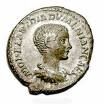

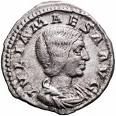

218 Roman consuls: Marcus Opellius Severus and Macrinus Oclatinius Advens. I quote in elegiacs all the crimes of Heliogabalus? On May 16 rebel troops set up Varius Avitus Bassianus (b. 203) (grandnephew of Julia Domna, the Syrian wife of Septimius Severus) as a rival emperor in Emesa, Syria; on June 8 Roman emperor (since 217) Macrinus (b. 165) and his son Diadumenianus (-218) are KIA in Cappadocia by the rebel army, and teenie-bopper Sun god priest Elegabalus (Heliogabalus) (Varius Avitus Bassianus) (Marcus Aurelius Antoninus) (203-22), the last of the Antonines becomes Roman emperor #25 (until 222), changing his name to Marcus Aurelius to legitimize his rule, claiming to be Caracalla's son, going on to marry famous male athlete Zoticus, along with his slave Hierocles; he soon begins promoting the licentious cult of El-Gabal (Elagabalus) (Heliogabalus) ("El of the Mountain"), Sun god of his hometown (whose priest he has been since early youth), while his iron lady grandmother Julia Maesa (-226) really rules things, making him adopt his cousin Marcus Julius Gessius Bassianus Alexianus (Alexander Severus) (208-35), son of her sister Julia Avita Mamaea (181-235) - hey, king Tut did it? Architecture: Elagabalus orders the Elagabalium built on the E side of the Palatine Hill to house the black conical meteorite holy to the faith, supposedly sent from Heaven and containing a rough picture of the Sun in its markings, incorporating the Roman Sun god Sol Invictus (Lat. "Unconquered Sun"); he forces senators to watch him dance around the altar to the sound of cymbals and drums, leading a big festival each summer solstice where he distributes food; too bad, he tries to place his god above Jupiter, and incorporate all other religions, even Judaism and Christianity, causing everybody to detest him? - the original Islam? Births: Roman emperor #41 (253-68) Publius Licinius Egnatius Gallienus (d. 268); son of Valerian (193-260) and Mariniana (daughter of Egnatius Victor Marinianus). Deaths: Roman emperor #24 (217-8) Macrinus (b. 165) on June 8 in Cappadocia.
219 Ethodius II (-235) becomes king of Scotland. The city of Sura W of the Euphrates River becomes the home of a major center of Jewish Torah scholarship under Rabbi Abba Arika (Heb. "Tall", "Lecturer") (175-247), which becomes the starting point for the chronology of the Talmudic Age - a coincidence that verses of the Talmud-quoting Quran are called sura? Roman consuls: Marcus Aurelius Antoninus Heliogabalus and Quintus Tineus Sacerdotus. Deaths: Chinese bamboo war god Guan Yu (b. 120) (KIA).
220 Roman consuls: Marcus Aurelius Antoninus Heliogabalus and Publius Valerius Comasonus Eutychiarus. The Ostrogoths invade Asia Minor, and the Visigoths migrate inside Germania. On Mar. 15 Cao Cao (emperor Wu of Wei) (b. 155) dies of illness, and his son Cao Pi crowns himself as Wei Wen Di (-227), emperor of Wei; Dong Han emperor Xian Di abdicates in favor of warlord Liu Bei (Xuan De) (Xuande) (161-223), who becomes emperor #1 of the Shu Han Dynasty in China (until 223), which rules Sichuan, Guizhou, and parts of Hubei and Gansu; the Han Dynasty, which ruled since 206 B.C.E. collapses, plunging China into 350 years of chaos and disunity, and the Three Kingdoms Period (Wei, Shu, Wu) begins (ends 280) - the Shu's on the other foot? Pope Callistus I excommunicates Sabellius. Tertullian notes the existence of several Christian bishoprics in Persia. Inventions: The first known depiction of the preparation of Tofu is made in N China - "I love tofu" is no longer obscene on license plates? Nonfiction: Lucius Flavius Philostratus (170-244), The Life of Apollonius of Tyana. Deaths: Chinese warlord Cao Cao (b. 155) on Mar. 15 in Luoyang, Henan; the Tomb of Cao Cao is discovered in 2009 in Xigaoxue villeage near the ancient city of Angyang in Henan province; "Speak of Cao Cao and he appears".
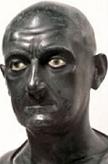
221 The 250th Olympiad. Roman consuls: Gaius Vettius Gratus Sabinianus and Marcus Flavius Vitelius Seleucus. Nonfiction: Jerusalem-born Libyan Roman Christian historian Sextus Julius Africanus (160-240) finishes his Chronographies (Chronographiae), a history of the world from Adam in 5500 B.C.E. to 221 C.E., which Bishop Eusebius Pamphili of Caesarea later corrects errors in; it dates Creation at 5500 years before the birth of Christ, and dates Christ's birth three years earlier than the usual, on Dec. 25 (winter solstice), based on his conception on the day of Creation, Mar. 25 (equinox), which is later adopted by the Eastern Christian churches; his work is lost except for fragments in Eusebius' Chronicon et al.



222 On Mar. 11 Roman emperor (since 218) Elagabalus (b. 203) is murdered along with his mother Julia Soaemias (180-222) by the Praetorian Guards, and on Mar. 13 his 14-y.-o. cousin and adopted son Maurcus Aurelius Severus Alexander (208-35) becomes Roman emperor #26 (until 235) (youngest) with the help of his iron lady grandmother Julia Maesa and his mother Julia Mamaea, who establish a regency committee of senators, with jurists Paulus and Ulpian giving advice; he abandons the Palatine Hill as the official residence of the Roman emperors. On Oct. 14 Calixtus I is martyred with clubs, and (St.) Urban I (-230) is elected bishop of Rome (pope #17); he soon justifies in an epistle the ownership of property by the formerly communistic Church, along with the elevation of bishops and the excommunication of heretics - the beginnings of Church wealth and power, and keeping people down in, you guessed it, 666 divided by the Holy Trinity? Sun Quan (-280) crowns himself king of Wu. Roman consuls: Marcus Aurelius Antoninus Heliogabalus and Marcus Aurelius Severus Alexander. Deaths: Syrian Christian poet Bardaisan (Bardesanes) (b. 154). Roman emperor #25 (218-22) Elegabalus (b. 203) on Mar. 11.
223 Roman consuls: Lucius Marius Maximus Perpetuus Aurelianus and Lucius Roscius Aelianus Paculus Salvius Julianus. Deaths: Chinese Shu Han emperor #1 (221-3) Liu Bei (b. 161) in Baidicheng, Chongquing.
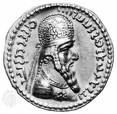
224 Ardashir I (d. 240), ruler of Persia revolts against Parthian king Artabanus (Ardawan) IV, last of the Arsacids, and defeats him at the Battle of Hormuzdagan, ending Parthian rule over Persia; the Parthian Empire ends, and the Sassanid Dynasty (last dynasty of native rulers) begins in Persia (ends 641), with Zoroastrianism established as the official religion, centered in Rhages in N Persia; its holy books are written in Pehlevi (Pers. "Parthian"), AKA Middle Persian (until 651). Roman consuls: Appius Claudius Julianus and Gaius Bruttius Crispinus. Nonfiction: The Bakhshali Manuscript (224-383) written on birch bark near the village of Bakhshali, India (modern-day Madan, Pakistan) contains the first known use of the zero symbol, a black dot; discovered in 1881.
225 The 251st Olympiad. The Yuezhi (Yuechi) Dynasty in Kushan (begun -40) ends. Chinese PM Zhuge Kongming (-234) conquers S Shu - does that include Seoul? About this time the Syriac Doctrine of the Apostles (Didascalia Apostolorum) is written. The first Count of Helfenstein, lord of the Fils River is mentioned as a citizen of Rome and capt. of the 5th legion of veterans in Germany, whose legion fought against Hannibal hence gets an elephant symbol in their coat of arms. Roman consuls: Tiberius Manilius Fuscus and Servius Calpurnius Domitius Dexter. Births: Roman emperor #32 (238-44) Gordian (Marcus Antonius Gordianus Pius) III (d. 244); son of Antonia Gordiana (201-) (daughter of Gordian I). Roman martyr (archdeacon of Rome, 257-8) (St.) Lawrence (Lat. "laurelled") of Rome (d. 258) in Hesca, Spain; feast day: Aug. 10.
226 Roman consuls: Marcus Aurelius Severus Alexander and Gaius Auphidius Marcellus.
227 Wei Wen Di dies, and Wei Ming Di (Cao Rui) (205-39) becomes emperor of Wei (until 239); Japan sends ambassadors; too bad, he goes on to spend excessive amounts on palaces and temples. Roman consuls: Marcus Nummius Senecio Albinus and Marcus Laelius Fulvius Maximus Aemilianus.
228 Roman consuls: Quintus Ajacius Modestus Crescentianus and Marcus Pomponius Mecius Probus.
229 The 252nd Olympiad. Roman census. The First Roman-Persian War begins (ends 232) after the Persians under Ardashir I attack the Roman provinces of Mesopotamia and Syria. Roman consuls: Cassius Dio and ?.

230 On May 23 Urban I dies, and on July 21 (St.) Pontian (Pontianus) (-235) is elected bishop of Rome (pope #18), ordering the chanting of the Psalms and the recital of the Confiteor before death, and the use of the salutation "Dominus vobiscum". The Ostrogoths settle near the Slavic tribes NW of the Black Sea. The Roman gold and silver mines in Dacia become exhausted. Kanishka II dies, and Vashishka (-250) becomes king of Kushan (until 250). Alexandrian bishop Origen (182-253) goes to Greece on an ecclesiastical mission, visiting Caesarea, where he is welcomed as a hero, pissing off Demetrius, who works to get the bishops in Alexandria to depose and banish him. The Ecumenical ("empire-wide") Synod of Iconium declares the baptisms performed by the Montanist sect invalid. Roman consuls: Lucius Virius Agricola and Sextus Catius Clementinus Priscilianus. Inventions: The Wheelbarrow with Sails is invented in China. Art: Frescoes in the Catacombs of Priscilla on Via Salaria in N Rome depict a women with outstretched arms like a priest giving Mass, and the earliest known image of the Madonna and Child; rediscovered in the 16th cent. Births: Roman emperor #48 (282-3) Marcus Aurelius Carus (d. 283) in Narbonne; father of Carinus (-285) and Numerian (-284).
231 After being attacked for castrating himself and/or heterodoxy, Origen flees from Alexandria to Caesarea, where he settles down for life. Roman consuls: ? Claudius Pompeianus and Titus Flavius Sallustius Pelignianus. Births: Syrian Queen of Palmyra (260-) Septimia Zenobia (Gr. "power of Zeus") (Bat-Zabbai) (d. ?) (b. 240?); wife of Septimius Odaenathus (220-67).
232 The Romans under Alexander Severus repulse the Persian invasion, ending the First Roman-Persian War (begun 229). A synod in Alexandria condemns Origen. Roman consuls: Lucius Virius Lupus Julianus Lucius Marius Maximus. Births: Roman emperor #47 (276-82) Marcus Aurelius Equitius Probus (d. 282) on Aug. 19 in Sirmium.
233 The 253rd Olympiad. The Vandals and Alamanni move to Germania, and settle in the Elbe (Albis) River Valley, safely E of the Roman limes on the Rhine River. Roman consuls: Lucius Valerius Maximus and Gnaeus Cornelius Paternus. Births: Neoplatonist philosopher Porphyry (Gk. "clad in purple")(Malchus = "king" in Hebrew) of Tyre (d. 309) (b. 234?) in Tyre.
234 Zhuge Kongming dies, and Fei Wei becomes PM of Shu. About this time the Andhra Dynasty in India (begun in 27 B.C.E.) disintegrates. Roman consuls: Marcus Clodius Pupienus Maximus and ? Sulla Urbanus.



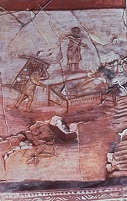
235 My horse is named Stinky, ain't he a beauty, mom? In Mar. after he is forced to buy peace from the Alamanni on the Rhine, Roman emperor (since 222) Alexander Severus (b. 208) and his mother Julia Mamaea are assassinated by disgruntled soldiers in Mainz; the Severan Dynasty comes to an end, beginning the Imperial Crisis of the Third Cent. (ends 284), a period of military anarchy marked by internal civil war, external invasion, and economic near-collapse, causing institutional changes that end the Classical World and begin the Medieval World; the Roman Empire becomes unstable until 284, with would-be emperors coming mainly from the martial Danubian provinces, while the govt. is bankrupt, currency is worthless, and inflation rages, along with plagues, causing depop. and the decline of cities and the urban elite; after the Rhine legions acclaim him, giant Thracian peasant Gaius Julius Verus Maximinus Thrax (the Thracian) (173-238) becomes Roman emperor #27 (until 238), the first "barracks" (soldier) emperor, who never sets foot in Rome, and begins the Thraxian Persecution of the Christian Church directed at its heads - like spraying Raid on stag cockroaches while the egg nests are safe behind the walls? On Sept. 29 after being exiled to the mines of Sardinia, Pontian dies, and on Nov. 21 (St.) Anterus (Anteros) (d. 236) is elected bishop of Rome (pope #19). On news of Alexander Severus' death, Arashir I invades Mesopotamia. Athirco (-247) becomes king of Scotland. Maximinus Thrax persecutes Origen, causing him to hide out in the house of Juliana of Cappadocia for two years. Roman consuls: Gnaeus Claudius Severus and Lucius Tiberius Claudius Aurelius Quintilianus. Art: About this time the Healing of the Paralytic is painted in the Syrian city of Dura Europos, becoming one of the oldest known depictions of Jesus Christ. Deaths: Roman Christian bishop (the first antipope?) St. Hippolytus of Rome (b. ?) in Sardinia (martyred): feast day: Jan. 30; leaves Philosophumena; Canons of Hippolytus; Chronicon, a history of the world from Creation to 234 C.E., which claims that Jesus Christ was born 9 mo. after the anniversary of the Creation (Mar. 25), i.e., Dec. 25; Discourse to the Greeks concerning Hades; Epistle of Mathetes to Diognetus?; author of the "Muratorian Fragment"? Roman historian Cassius Dio (b. 155); leaves the 80-vol. History of Rome, from Aeneas to the year 229 C.E.

236 On Jan. 3 Anterus dies after a reign of 40 days, and on Jan. 10 (St.) Fabian (Fabianus) (-251) is elected bishop of Rome (pope #20) after a dove lands on his head during a brainstorming session of brethren. The Franks ("freemen") a new coalition of Germanic tribes (Chatti, Chauci, Cherusci) on the middle Rhine (Ripuarian Franks) and lower Rhine (Salian Franks) is formed in Lower Germany. The Alamanni pour into Alsace. Roman consuls: Gaius Julius Verus Maximinus Thrax and Marcus Pupienus Africanus.
237 The 254th Olympiad. Roman consuls: Lucius Marius Perpetuus and Lucius Mummius Felix Cornelianus.





238 Five in one is for oil not emperors? On Mar. 22 Maximinus' procurator is assassinated, and Marcus Antonius Gordianus (Gordian) I (159-238) and his son Gordian II (192-238) are proclaimed Roman co-emperors #28 and #29 in Africa; on Apr. 2 the Senate recognizes them, but they are killed on Apr. 12 by the army of Capelianus, gov. of Numidia (prefect of Mauretania), loyal to Maximinus; on Apr. 22 with the invasion of Maximinus Thrax imminent, a group of 20 senators elects two more emperors, Marcus Clodius Pupienus Maximus (164-238) (Roman emperor #30) and Decimus Caelius Calvinus Balbinus (165-238) (Roman emperor #31), and under public pressure they name the future Gordian III (son of Gordian I's daughter) as Caesar; Pupienus heads for Ravenna to meet the invading army of Maximinus, whose own soldiers murder him and his son on June 24 while sieging Aquileia, presenting their heads to Pupienus, who returns to Rome, finding a civil war brewing; too bad, Balbinus and Pupienus become distrustful of each other, and are murdered on July 29 by the Praetorian Guards after they refuse to let their own German guard come to their aid; the Praetorians proclaim teenie Gordian (Gordianus) III (225-44) as Roman emperor #32 (until 244). The Romans are in turmoil, so you all go thataway and we'll go thisaway? The first major Gothic invasion of Roman territory occurs at the city of Histria (Istros) (Sinoe) on the Black Sea coast at the mouth of the Danube River, spreading into Asia Minor and the Balkans; the Romans begin paying tribute to them (until 245); at this point the Goths divide along the Dniester River into the Visigoths (Thervings) (Western Goths) and Ostrogoths (Greutungs) (Eastern Goths). The Carpi invade Dobuja in Dacia repeatedly (ends 244). Roman consuls: Gaius Fulvius Pius and ? Pontius Proculus Pontianus. Deaths: Roman emperor #27 (235-8) Maximinus Thrax (b. 173) in June 24 in Aquileia.
239 Wei Ming Di dies, and Wei Fei Di (Cao Fang) (Ts'ao Fang) (231-74) becomes emperor of Wei (until 274), sending an ambassador to Japan. Roman consuls: Marcus Antonius Gordianus Pius Felix and Manius Acilius Aviola.
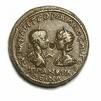
240 Roman consuls: ? Sabinus and ? Seius Venustus. In Africa Sabinianus is proclaimed emperor, but is quickly defeated. Gordian III appoints Gaius Furius Sabinius Aquila Timesitheus (-243) as Praetorian prefect, and marries his daughter Furia Sabinia Tranquillina in the summer; Timesitheus dominates the teen emperor. Hatra, the Romans' easternmost military garrison is captured by the Sassanians. Ailing Ardashir I of Persia makes his son Shapur I co-regent. Eusebius of Caesarea mentions an Arab Christian bishop named Beryllus in the sea of Bostra, who holds a synod. Births: Roman Christian writer ("the Christian Cicero") Lucius Caelius (Caecilius) Firmianus Lactantius (d. 320) in N Africa; pupil of Arnobius. Births: Christian anti-Arian archbishop of Constantinople #1 (314-337) (St.) Alexander of Constantinople (d. 337) (b. 237-45?); feast: Aug. 28. Deaths: African Christian theologian Tertullian (b. 155) in Carthage; leaves Adversus Judaeos (Against the Jews) (8 vols.): "What has Athens to do with Jerusalem?"; "[The Roman pagans] looked at the Christians as the cause of all catastrophes and all national disasters. If the Tiber floods in the City, if the Nile floods in the countryside, if the heavens stand still but the earth shakes, if a famine or plague is announced, a voice immediately goes up: let the Christians be thrown to the lions!" Libyan-born Roman Christian traveler-historian Sextus Julius Africanus (b. 160); predicts the Second Coming of Christ in the year 500. Greek poet and Roman official Herodian of Antioch (b. 170); leaves History of Rome from the Death of Marcus Aurelius to the Accesssion of Gordianus III (180-238) (8 vols.); lost to the West until tr. by Italian Renaissance scholar Poliziano (Politian) (Angelus/Agnolo Ambrogini) (1454-94).
241 The 255th Olympiad. Roman consuls: Marcus Antonius Gordianus Pius Felix and Clodius Pompeianus.
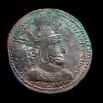

242 In Feb. Ardashir I dies, and his son Shapur (Sapor) (Shabuhr) I tyhe Great (-270) succeeds him as king of Persia (until May 270), demanding all Roman territories in Asia and invading Mesopotamia and Syria, beginning the Second Roman-Persian War (end 244); at his accession his gay bud, er, companion Mani ("the Illustrious") (216-77) (founder of Manichaeism) begins his public preaching in Seleucia-Ctesiphon, teaching a rigid dualism that claims to surpass the teachings of Christianity, Buddhism, and Zoroastrianism, claiming to be the Paraclete and Last Prophet, also an apostle of Jesus Christ, revering his mother Mary. Timesitheus drives Persian king Shapur I out of Carrhae this year and next. Roman consuls: Gaius Vettius Gratus Atticus Sabinianus and Gaius Asinius Lepidus Praetextatus.
243 Roman census. In the fall Gordian III knots, er, joins his army in Upper Mesopotamia, and marches down the Euphrates River, recapturing Carrhae and Nisibis in SE Anatolia, then wins a decisive V at the Battle of Resaina; Septimius Severus makes Nisibis his HQ, and reestablishes a Roman colony there. Timesitheus dies of disease, and the surviving praetorian prefect Caius Julius Priscus convinces Gordian III to appoint his brother Marcus Julius Philippus (Philip the Arab) as his successor (co-Augustus). Roman consuls: Lucius Annius Arrianus and Gaius Cervonius Papus.
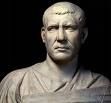

244 On Feb. 11 after driving the Persians out of Syria and invading Iraq, Gordian III is defeated and KIA by the Persians at the Battle of Misiche 40 mi. W of Baghdad (modern-day Fallujah), renaming the city Peroz-Shapur ("victorious is Shapur"); the Romans try to cover it up by claiming that he died near Circesium on the Euphrates River 250 mi. upstream, and that they built a cenotaph nearby in Zaitha; Roman emperor (since 238) Gordian III (b. 225) is succeeded as Roman emperor #33 by Marcus Julius Severus Philippus (Philip I the Arab) (204-49) (who is suspected of engineering Gordian III's death by cutting off supplies and/or fomenting discontent), and negotiates a peace treaty with the Persians, paying them 50M sesterces and ending the Second Roman-Persian War (begun 241); he makes his 7-y.-o. son Philip II (237-49) nominal co-ruler. Roman consuls: Tiberius Pollenius Armenius Peregrinus and Marcus Laelius Fulvius Maximus Aemilianus. Architecture: The Dura-Europos Synagogue on the right bank of the Euphrates River near modern-day Salhiye, Syria is first mentioned; rediscovered in 1932. Births: Roman emperor #51 (284-305) Diocletian (Gaius Aurelius Valerius Diocletianus) (Diocles) (d. 312) on Dec. 22 in Dioclea (near Salona), Dalmatia (modern-day Solin, Croatia); an Illyrian of low birth. Deaths: Greek philosopher Lucius Flavius Philostratus (b. 170). Roman emperor #32 (238-44) Gordian III (b. 225) on Feb. 11 in Zaitha (KIA).

245 The 256th Olympiad. Roman consuls: Marcus Julius Philippus Arabicus and Gaius Messius Titianus. Roman emperor Philip the Arab stops paying tribute to King Ostrogotha of the Ostrogoths (Amaling), causing the latter to cross the Danube River with his army and plunder Moesia and Thrace; Decius arrives, and the Goths retreat back over the Danube into Germania. Nonfiction: Origen of Alexandria (182-253), The Hexapla; 6-col. parallel Old Testament Bible trans.; The Tetrapla, consisting only of the translations of Aquila, Symmachus, Theodotion, and the Septuagint is later made by chopping up the Hexapla.
246 Roman consuls: Gaius Bruttius Presens and Gaius Allus Albinus.
247 In the summer emperor Philip the Arab appoints his 10-y.-o. son Philip II (237-49) as Augustus. The Goths cross the Danube River again. The Roman limes (military roads and fortifications on the frontier) are no longer repaired after this year - my favorite part of any empire is the descent? Nathalocus (-258) becomes king of Scotland. Christians prophets predict that their persecution by the Romans are proof that Christ's Second Coming is nigh. Roman consuls: Marcus Julius Philippus Arabicus and Marcus Julius Philippus Junior.



248 On Apr. 21 Rome celebrates its big 1,000th birthday with secular games (Ludi Saeculares) presided over by pagan emperor Philip I the Arab, who throws one hell of a party, and has 1K gladiators fight to the death, along with hundreds of exotic animals - bringing back many good memories, maybe some sad ones too? Victory is declared against the Goths in Moesia and Pannonia, but the army is dissatisfied and revolts, proclaiming Tiberius Claudius Marinus Pacatianus (-249) as emperor; in the east M.F. Iotapianus (Jotapianus) (-249) leads a revolt against Philip's brother Gaius Iulius Priscus, rector Orientalis, who was raising too heavy taxes. Cyprian (Lat. "from Cyprus") (200-58) becomes bishop of Carthage. Roman consuls: Marcus Julius Philippus Arabicus and Marcus Julius Philippus Junior. Nonfiction: Origen of Alexandria (182-253), Contra Celsum (Kata Kelsou) (Against Celsus) (8 vols.); written in Caesarea at the request of his patron Ambrose after receiving a copy of pagan philosopher Celsus' 178 work The True Word (Logos Alethes) against Christianity in 240, which is later lost on purpose, attacking Jesus Christ for "perverting the words" of the great Greek philosopher Plato, who "is not guilty of boasting and falsehood" like Christian theologians; for attracting the uneducated lower classes, with the blind faith required of Christians ("Do not ask questions, just believe; thy faith will save thee"), and refusal to recognize the state religion that requires regular sacrifices to the emperor's genius or to serve in the Roman military threatening the empire's stability, compounded by Christians' secrecy, "entering into secret associations with each other contrary to law"; his refutation praises the philosophy of Plato but claims that the Bible agrees with it and contains even greater wisdom, that Greek philosophers accept the doctrines of their school founders without question too, and that Christianity has "Spirit and power" (1 Cor. 2:4), as proved by Jesus selecting lowly peasants as his disciples to show the world that learned rhetoricians aren't needed to spread the faith; he counters Celsus' argument that the incarnation of Jesus is moose hockey by the assertion that the Logos could only reveal God to man by first becoming flesh; after showing that pagan myths can be just as ludicrous as the Bible stories he objects to, Origen claims that that all Christians are priests and should drop out of the system like pagan priests do; finally, that Christians' secrecy regarding mystical teachings is no different than the Pythagoreans'; considered a slam dunk, it becomes the std. Christian apology. Births: Roman empress (St.) Helena (d. 329)) in Drepanum in Bithynia; wife of Constantius I Chlorus (250-360); mother of Constantine I the Great (271-337); starts out as a Balkan barmaid slash ho; feast day: Aug. 18.

249 The 257th Olympiad. Pacatianus and Iotapianus are defeated and KIA, and Roman emperor (since 244) Philip the Arab (b. 204) sends Danube native and suffect consul Decius (Gaius Messius Quintus Traianus Decius) (201-51) to restore discipline among the Danubian troops, but they revolt again in the spring, proclaiming Decius emperor; in June Decius defeats and kills Philip the Arab in Verona, and becomes Roman emperor #34 (until 251), the first from Illyricum; Philip's son Philip II (b. 237) is murdered by the Praetorian Guards in Rome after they learn the good news; Iotapianus' body is delivered to Decius in the summer in Rome. Roman consuls: Marcus Laelius Fulvius Maximus Aemilianus and Lucius Nervius Aquilinus. Architecture: Decius starts a building program in Rome late in the year, restoring the Colosseum, and building the Decian Baths along the Aventine Hill (SW of the Circus Maximus); he gives himself the name Trajan. Deaths: Roman emperor #33 (244-9) Philip I the Arab (b. 204) in June in Verona (KIA). Roman emperor Philip II (b. 237) in Rome (executed).


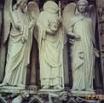
250 In the winter of 249-50 the Thames River is frozen hard for 9 weeks. Decius elevates his sons Quintus Herennius Etruscus Messius Decius (227-51) and Hostilian (Gaius Valens Hostilianus Messius Quintus) (-251) to Caesars (Roman emperors #35, #36). Decius defeats Gothic king Kniva, then is defeated at the Battle of Beroea, and is forced to flee for safety; meanwhile Julius Valens Licinianus proclaims himself emperor at Rome, but is executed within a few days. In this half cent. the Germanic tribe of Saxons presses S from N Albingia in Schleswig-Holstein to the Weser River region, fighting and absorbing the Chauci and Angrivarii by the 4th cent. Roman consuls: Gaius Messius Quintus Trajanus Decius and ? Vettius Gratus. Novels: About this time Greek writer Heliodorus of Emesa, born in Emesa (modern-day Homs), Syria writes the Ethiopian romance Aethiopica, later used by Cervantes, Racine, and Tasso. Births: Roman emperor #53 (305-6) Flavius Valerius Constantius I Chlorus (the Pale) (d. 306) on Mar. 31 in Dardania (Serbia); father of Constantine I the Great (271-337); member of the pagan monotheistic cult of the Unconquerable Sun. Roman emperor #52 (286-305) Maximian (Marcus Aurelius Valerius Maximianus Herculius) (d. 310) near Sirmium Pannonia (Serbia) (Serdica?); shopkeeper parents. Roman emperor #54 (305-11) Galerius (Gaius Galerius Valerius Maximianus) (d. 311) in Felix Romuliana (near Zajecar, Serbia); Thracian father, Dacian mother. Egyptian bishop Arius (d. 336); beloved/hated Catholic deep thinker, founder of Arianism, which denies the Trinity, and claims that the uncreated God created and "adopted" Christ. Egyptian monk (St.) Anthony the Great (d. 350) in middle Egypt; founder of Christian monasticism (monachism); patron saint of the the poor; feast day: Jan. 17. Deaths: Kushan king Vashishka (b. ?). Christian presbyter (St.) Felix of Nola (b. ?) (martyred); son of Syrian soldier Hermias, who retired to Nola, Italy; feast day: Jan. 14.

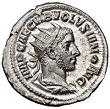


251 In Jan. the 15-year Cyprian Plague (ends 266) begins, killing up to 5K a day in Rome, pissing off Roman emperor (since 249) Decius (b. 201), and causing him to blame the Christians for failing to recognize him as divine and incurring the wrath of the gods, launching the Decian Christian Persecution, the first gen. empire-wide persecution in their history, incl. all who will not sacrifice to him; the "persecution" is a law requiring all citizens to sacrifice to the state gods and to be in possession of a libellus, a certificate from a temple confirming the act; some claim this proves that his hated enemy Emperor Philip I the Arab must have been the first Christian emperor - you have to carry a libel around with you that says you're a pagan doomed to Hell or you die? On Jan. 20 St. Fabian, bishop of Rome is martyred; in Mar. (St.) Cornelius (-253) is elected bishop of Rome (pope #21); after he takes a lenient course with lapsed Christians, in Mar. rival Novatian (-258), the first Roman theologian to use the Latin language becomes the 2nd antipope, becoming more strict about lapsi (turncoats) than the other pope Cornelius, who excommunicates him, after which his followers set up the sect of Novatianism, which lasts for cents.; the first record of disfellowshiping a church for erroneous doctrines? Decius tries to revive the office of censor, offering it to future emperor Valerian; meanwhile by mid-spring his Christian persecution slackens enough to allow Pope Fabian to send out seven dwarfs, er, bishops from Rome to Gaul to evangelize the pesky pagans: (St.) Gatien (Gatianus) (-301) to Tours, (St.) Trophimus (Trophime) to Arles, (St.) Paul of Narbonne to Narbonne, (St.) Saturninus (-257) to Toulouse, (St.) Denis (Denys) (Dionysius) (-275) to Paris, (St.) Austromoine (Austremonius) ("apostle of Auvergne") to Clermont, and (St.) Martial to Limoges; St. Denis settles on an island near Paris and starts making numerous converts, until his arrest is ordered by Roman gov. Sisinnius Fescennius along with his two companions, St. Eleuther and St. Rustic (a priest and a deacon), and they are tortured to test their faith, then beheaded on Montmartre ("Mount of Mars") hill in Paris (which is then changed to mean "Mount of the Martyr"), and the bodies thrown into the Seine River, after which Denis rises and walks on the water, picks up his head in his hand, and marches 2 mi. to his burial place (4 mi. N of Paris), where a Christian woman named Catulla buries them all in a tomb, which in the 630s is founded as the Abbey of St. Denis by Dagobert I of the Franks, and Denys becomes the patron saint of France, with French soldiers using the war cry "Montjoye Saint Denis"; his feast day is Oct. 9, on which the hymn is chanted: "The corpse immediately arose, the trunk bore away the severed head, guided on its way by a legion of angels"; too bad, after the pesky Protestants point out that this is a ripoff of the pagan "Festum Dionysi Eleutherei Rusticum" (Rustic Festival of Dionysus Eleuthereus), they finally abolish the office of St. Denys in 1789; "The distance (2 mi.) doesn't matter, it's that first step that was the most difficult" (Mme. du Deffand). Decius pushes the Carpi out of Dacia, then the Ostrogoths under king Cniva invade Moesia Inferior (S of the Danube River), where Decius' son Herennius is killed outside Philippopolis; Decius proclaims that the death of one soldier is not a great loss to the republic, then chases conniving Cniva, who is making off with his spoils, and is defeated and KIA along with his son Herennius Etruscus on July 1 at the Battle of Abrittus (Forum Terebronii) in the Dobruja (Moesia Inferior) about 60 mi. NE of Philippopolis after being tricked in June into fighting from an inferior position before relief can arrive, the Goths pretending to be defeated and surrounded but refusing to surrender, causing the Romans to have to stage a final attack, which backfires; Christian-persecuting Decius becomes the first Roman emperor to be killed in a battle with foreign invaders (guess who celebrates?); his entire Roman field army is wiped out along with him; St. Cyprian notes that the gen. opinion of the pop. of Rome is that the collapse of the Roman Empire is nigh. Titus Julius Priscus, gov. of Macedon proclaims himself Augustus at Philippopolis towards the end of the year, with Gothic support, but the Senate declares him a public enemy, and Gaius Vibius Trebonianus Gallus (206-53) becomes Roman emperor #37 (until 253) after the army of Moesia proclaims him, and names Decius' son Hostilian as co-emperor, while raising his own son Gaius Vibius Volusianus (-253) to Caesar (Roman emperor #38); he then signs an unpopular peace treaty with the Goths, letting them get away with their loot so that he can more quickly return to Rome and solidify his power; he finds Rome suffering from the plague, and Hostilian dies in July, causing Gallus to make his son Volusianus co-emperor. If you're a gutter muffin, go to church? About this time (during the reign of Decius) 12-ft.-tall staff-carrying superman St. Christopher (Gr. "Christ-bearer") suffers martyrdom in Syria after supposedly lending his great strength only to the mightiest kings on Earth, seeing a king tremble at the Devil and becoming the Devil's servant, then seeing the Devil trembling before an image of Christ and switching to Christ, then carrying Christian pilgrims over a river, until Christ himself in the form of a child appears, and he finds it almost too much to bear as he grows heavier and heavier, and guess what Christ says, "Marvel not, for me with me thou hast borne the sins of all the world"?; both the Roman and Greek churches adopt him as a saint, with the Roman festival on July 25 and the Greek on May 9. Roman consuls: Gaius Messius Quintus Trajanus Decius and Gaius Vibius Trebonianus Gallus and Quintus Herennius Etruscus and Gaius Valens Hostilianus. Births: Egyptian Christian monasticism founder (St.) Anthony (Antony) the Great (d. 356) (b. 250?) on Jan. 12 in Herakleopolis Magna; feasst day: Jan. 17. Deaths: Roman emperor #34 (249-51) Decius (b. 201) in July 1 in Abrittus (KIA).


252 A new Christian persecution by Gallus breaks out, and Pope Cornelius flees to Centum Cellae (Civita Vecchia). The Persians under Shapur I attack the E frontier in a dispute over control of Armenia, defeating the Romans at the Battle of Barbalissos, and capturing Nisibis. Marcus Aemilius Aemilianus (207-53), gov. of Moesia (a Moor) refuses to pay tribute to the Goths as agreed by Gallus, then defeats them, and is proclaimed emperor by his troops - the Roman Barack Obama? Roman consuls: Gaius Vibius Trebonianus Gallus and Gaius Vibius Afinius Gallus Veldumnianus Volusianus. Deaths: Chinese Wu emperor #1 (229-52) Sun Quan (Da) (b. 182).
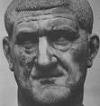


253 The 258th Olympiad. In June St. Cornelius dies in exile (martyred), leaving a Correspondence With St. Cyprian on the question of the lapsi, and on June 25 (St.) Lucius I (-254) is elected bishop of Rome (pope #22). In July Roman emperor (since 251) Gallus (b. 206) and his son Volusianus are defeated by Aemilianus at the Battle of Interamna Nahars on the Flaminian Way; after they flee, they are murdered by their own guards at Forum Flaminii by Aug.; Aemilianus becomes Roman emperor #39, and marches to Rome, where the Senate grudgingly recognizes him; in Sept. Valerian, cmdr. of Roman forces beyond the Alps (Rhaetia) comes to Rome with his army, causing Aemilianus' spooked troops to murder him, and Valerian I (Gaius Publius Licinius Valerianus) (193-260) becomes Roman emperor #40 (until 260), with his son Publius Licinius Egnatius Gallienus (218-68) as co-Augustus (Roman emperor #41) (until 268); Valerian I then decides to split the Empire, remaining emperor of the valuable East, with Gallienus as emperor of the chickenshit West, ruling from Treves with his infant son Salonius. Roman consuls: Gaius Vibius Afinius Gallus Velumnianus Volusianus and Lucius Valerius Maximus. Deaths: Egyptian Christian bishop Origen of Alexandria (b. 182) in Caesarea or Tyre; dies after being tortured in the Decian Persecution in 251 but not lucking out and becoming a martyr; leaves 6K scrolls, which help to veer the Church towards Platonism, incl. On Prayer (the best way is to do it standing with hands outstretched and eyes raised, except when praying for personal sins, where kneeling is mandatory, although angels are spherical and have no knees?), On Martyrdom (the most holy profession of the Christian?), and On First Principles, the first attempt to present Christianity as a complete theory of the Universe. Roman emperor #35 (251-3) Gallus (b. 206) in Aug. in Interamna, Umbria. Roman bishop (St.) Cornelius (b. ?) in June (martyred); feast day (with St. Cyprian): Sept. 14.

254 On Mar. 5 Lucius dies, and on May 12 (St.) Stephen I (-257) is elected bishop of Rome (pope #23), ordaining that vestments used for ecclesiastical purposes not be used for daily wear. Roman consuls: Publius Licinius Valerianus and Publius Licinius Egnatius Gallienus.
255 Kanishka III (-275) becomes king of Kushan. Roman consuls: Publius Licinius Valerianus and Publius Licinius Egnatius Gallienus.
256 Valerian campaigns against Shapur. The ancient city of Ashur is destroyed for the last time; ancient Assyria is now ruins and dust. The frontier fortress of Dura-Europos on the right bank of the Euphrates River near modern-day Salhiye, Syria is sieged by the Persian Sassanians under Shapur I (until 257), who undermine the walls and use poison gas (toxic smoke). Wei Fei Di dies, and Cao Pi's grandson Wei Gao Gui Xian Gong (Yanshi) (Cao Mao) (242-60) becomes emperor of Wei (until 260); Jiang Wei of the Shu unsuccessfully attacks Wei. Roman consuls: Lucius Valerius Maximus and Marcus Acilius Glabrio. Births: Spanish Roman Catholic bishop (295-) Hosius (Osius) (Ossius) of Cordova (Corduba) (d. 359) in Roman Corduba, Hispania.


257 The 259th Olympiad. Roman census (the last regular 14-year census). Dura-Europos falls to the Sassanians, and falls into disrepair, later disappearing after getting covered with mud and sand; it is rediscovered in 1920. Emperor Valerian begins the Valerian Persecution of the pesky Christians with two edicts in the same year, the 1st commanding them to sacrifice to the pagan gods, the 2nd ordering the execution of all bishops, priests, and deacons; on Aug. 2 Stephen I is beheaded on his pontifical chair in the Catacombs of St. Callixtus, and on Aug. 30 (St.) Sixtus II (-258) (a Greek) is elected bishop of Rome (pope #24). The Franks cross the "Safeguard of the Provinces" (the Rhine River) and invade Gaul, causing Gallienus to send gen. Marcus Cassianius Latinius Posthumus (-269), who scores a long series of Vs, gaining the titles of "Conqueror of the Germans" and "Savior of Gaul". The Goths invade the Eastern Roman Empire again. Roman consuls: Publius Licinius Valerianus and Publius Licinius Egnatius Gallienus. Births: Greek Christian bishop (St.) Gregory the Illuminator (d. 337); patron saint of Armenia; son of Anak of Parthia, who assassinates Chosrov I. Deaths: Greek Christian bishop (of Toulouse) (St.) Saturnin(us) (b. ?) in Toulouse, France; martyred by being dragged tied by the feet to a bull after he passes the pagan (Mithraic?) temple too much; his pupil St. Fermin gets the credit later somehow; feast day: Nov. 29.

258 On Aug. 6 Roman bishop Sixtus II is martyred by Roman soldiers while holding an illegal assembly in a cemetery along the Appian Way; his office remains empty for two years. The Franks sack Gaul, occupy Spain, sack Tarragona, seize ships, then head for Africa by ship, attacking Mauritania. The Goths attack Greece, Thrace, and Asia Minor, reach the Black Sea, and molest Asia and the Aegean area from ships. The Persians invade Mesopotamia and Syria, conquer Antiochia and sack Edessa and absorb it into their empire, trapping a bunch of Christians, beginning the Third Roman-Persian War (ends 260); meanwhile Septimius Odenathus (d. 273) becomes king of Palmyra (modern-day Tadmor) in the Syrian desert, an oasis known for its perennial springs and palm trees, located halfway between Damascus and the Euphrates, getting rich from tariffs. Donald II (-269) becomes king of Scotland (until 269). Roman consuls: Marcus Nummius Tuscus and ? Mummius Bassus. Deaths: African Carthage Christian bishop (St.) Cyprian (b. 200) (martyred). Roman Christian bishop (St.) Lawrence (b. 225) (of Seaway fame) on Aug. 10 in Rome (martyred); executed after being ordered to turn over the Church's riches, and he distributes them to the poor instead, claiming that the cripplied, blind and suffering are the Church's true treasures; sends the Holy Grail to relatives in Huesca, who give it to the monastery of San Juan de la Pena, where it remains for centuries? Roman Christian antipope Novatian.
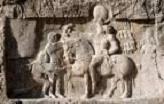

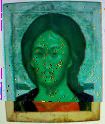
259 After Roman emperor (since 253) Valerian I (b. 193) and his 70K-man army reclaim the Syrian provinces and close in on precious Edessa, the Battle of Edessa sees the entire Roman force captured or killed by the Persians under king Sapor (Shapur) I, who suffer minimal casualties of their own; Valerian I is captured, and Sapor I gets his jollies by publicly humiliating and using him as a stepping-stone to mount his horse, after which he is killed by next year, then skinned and stuffed with manure and mounted in a Persian temple as a trophy; the Roman POWs are used in engineering projects around Susa; the Mandylion (Gr. "towel") of Edessa, the alleged Shroud of Christ is allegedly carried into battle by the Persians, who give it the credit for their incredible V; Gallienus continues to reign alone, completing the process of substituting equestrians for senators as legion cmdrs. and govs; meanwhile the Period of the Thirty Tyrants (ends 268) begins as Roman legions throughout the empire crown their own emperors; Roman gen. Marcus Posthumus revolts, and forms his own empire out of the Gallic provinces (Gaul, Britain, Spain); the success of the barbarian incursions cause cities in the Roman Empire to reverse cents. of arrogance and begin building walls and sink into a siege mentality; nervous emperor Gallienus issues an edict of toleration of the Christians, giving the Church a legal existence and establishing a peace with it that lasts 40+ years (until 303). The Alamanni continue their attacks, reaching as far as Milan, and invade the Agri Decumantes along the Danube River. Roman consuls: ? Nummius Aemilianus Dexter and Tiberius Pomponius Bassus. Births: Syrian emperor of Palmyra (267-2) Vaballathus (Lucius Julius Aurelius Septimius Vaballathus Athenodorus) (d. ?) in Palmyra, Syria; son of Odaenathus (220-67) and Zenobia (220-?).

260 In the spring the Germans rise all along the border and destroy the limes (frontier fortifications); the Rhine and Danube Rivers again become the Roman frontiers. On July 22 (St.) Dionysius (Denis) (-268) is elected bishop of Rome (pope #25), calling a synod in Rome which condemns Sabellianism - they're breeding like mice in the pantry? The Alamanni invade Italy and drive the Romans out of Arae Flaviae, which by the late 700s becomes known as Rotuvilla (Rottweil) in modern-day Swabia; German dogs mix with the Roman mastiffs, eventually creating the Rottweiler herding breed. Odenathus of Palmyra defeats the Persians, keeping them out of Asia and ending the Third Roman-Persian War (begun 258). Nasha'karib Yuhamin II Yuharhib (-275) becomes the 79th and last king of Saba in S Arabia (founded -860). The Germanic Jutes (Juthungi) (Luti) (Lutae) invade Rhaetia (Raetia). In this decade the Vandals first appear on the C Danube River, and along with the Visigoths, the nomadic Germanic Heruli (fierce warriors who don't like to wear armor, and kill widows and the aged?), the Gepids, the Slavic Bastarni (Bistrani) (from Thrace?), and the nomadic Iranian Sarmatians they invade Roman Dacia with about 320K men. Roman consuls: Publius Cornelius Secularius and Gaius Junius Donatus. Births: Roman Arian ecclesiastical historian ("Father of Church History") and bishop of Caesarea (314-) Eusebius (Pamphili) of Caesarea (d. 340) (b. 265?) in Caesarea Maritima, Palestine; of Greek descent. Deaths: Roman emperor #40 (253-60) Valerian I (b. 193) in or near Edessa.
261 The 260th Olympiad. 300K Alamanni sack Mediolanum (Milan) in the Po Valley of Italy, and Gallienus personally leads a (10K-man?) Roman army and kicks their butts, then marries Pipa, daughter of the Marcomanni (Suevi) king and allows them to settle in Pannonia; the prejudiced Romans call her his concubine not wife? Roman consuls: Publius Licinius Egnatius Gallienus and Lucius Petronius Taurus Volusianus and (in Gaul) Marcus Cassianius Latinius Posthumus.
262 Roman consuls: Publius Licinius Egnatius Gallienus and ? Nummius Fausianus and (in Gaul) Marcus Cassianius Latinius Posthumus.
263 The Ostrogoths invade Asia Minor by sea; the Temple of Artemis (Diana) (Artemision) in Ephesus (built -356), long since stripped of its riches by Nero is destroyed by the Ostrogoths; the great altar W of the temple precinct is excavated in modern times. The Sarmatians burn Callatis on the Black Sea Coast. Zhong Hui ends the Shu Kingdom. Roman consuls: Marcus Nummius Ceionius Albinus and ? Dexter Maximus.
264 Births: Roman consuls: Publius Licinius Egnatius Gallienus and Saturninus.
265 The 261st Olympiad. Huan abdicates in favor of Sima Yan, who is crowned emperor Jin Wu Di (236-90) (until 290), founding the Xi (Western) Jin Dynasty in China (ends 420). Aspacures (Aspagur) I (-284) becomes Arsacid king of Iberia (Karlia) in Georgia (unti 284), fighting Sassanid expansion aided by the Romans under emperors Aurelian and Carus. Roman consuls: Publius Licinius Valerianus Junior and Lucillus. Births: Roman emperor #59 (308-24) Valerius Licinianus Licinius (d. 324); of Dacian peasant origin; father of Licinius II (314-24).
266 Roman consuls: Publius Licinius Egnatius Gallienus and ? Sabinillus.
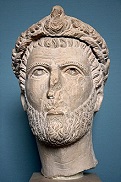

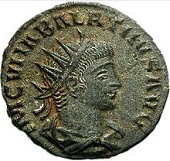
267 Palmyran king (since 260) Odaenathus (b. 220) is assassinated along with his son (by his 1st wife) and designated heir Herodes near Emesa or Heraclea Pontica (to get her stepson Herodes out of the way?), and his widow Queen Septimia Zenobia (Gr. "power of Zeus") (Bat-Zabbai) (231-?) succeeds as regent for their emperor son Vaballathus (Lucius Julius Aurelius Septimius Vaballathus Athenodorus) (259-?) while holding de facto power, declaring the independence of Palmyra, but not really, pretending to be defending the frontiers for the Roman emperor - while the cat's away, the mice will play? The Goths invade Asia Minor, invade the Greek peninsula, capture Athens, and lay waste to Argos, Corinth, and Sparta (267-8); the Goths and the Roman emperors duke it out for the next cent., meanwhile devastating the Balkan Peninsula and NE Mediterranean. Roman consuls: ? Paternus and ? Archesilaus and (Gaul) Marcus Cassianius Latinius Posthumus and Marcus Piavonius Victorinus.

268 In Sept. Roman emperor (since 253) Gallienus (b. 218) is assassinated by his own troops outside Mediolanum (Milan) as he is sieging the pretender (one of the Thirty Tyrants) Aureolus (Gallienus' cavalry cmdr. stationed in Milan), who in turn is slain by Illyrian pretender Claudius II (Marcus Aurelius Valerius Claudius II Gothicus) (214-70), who becomes Roman emperor #42 (until 270); in Sept.-Oct. he defeats the Ostrogoths at the Battle of Naissus (Nisch) (Nish) in Serbia, gaining the title Gothicus; meanwhile 100K Alamanni break through the Roman frontier at the Brenner Pass, and in Nov. Claudius II's 35K-man Roman army defeats them at the Battle of Lake Benacus (Garda) in N Italy, killing or capturing more than half of them and chasing the rest back over the Alps; he then defeats more Goths at the Battle of Marcianopolis on the right bank of the Danube River in Lower Moesia, and defeats the S Gauls, bringing the Iberian provinces back into the empire, all of which gain him the title Gothicus; meanwhile more Romans repulse more Goths from Asia Minor and Greece, allowing Athens to recover its stature as the intellectual center of the empire and the seat of pagan culture (until 395). The 24-rune (ON "secret", "magical") Elder Futhark (Futhroc) Alphabet based on the Western Greek alphabet is invented by the Goths after their expedition to Asia Minor. Roman consuls: ? Aspasius Pagernus and ? Egnatius Marinianus. Deaths: Roman emperor #41 (253-68) Gallienus (b. 218) in Sept. in Milan. Roman bishop Dionysius (Denis) (b. ?) on Dec. 26.

269 The 262nd Olympiad. On Jan. 3 (St.) Felix I (-274) becomes bishop of Rome (pope #26), starting the custom of burying martyrs under church altars and celebrating Mass on their tombs. Claudius II defeats the pesky Ostrogoths in Thracia, then settles a large number of turncoat Goths in the vacant lands of the Danubian provinces, effectively ending the German menace in the Balkan frontier for decades. Empress (since 200) Jingu (b. 169) dies, and her 70-y.-o. son Hondawake (Homutawake) (Ojin) (200-310), 4th son of emperor Chuai and empress Jingu becomes Japanese Yamato emperor #15 (until 310), ruling 40 years from two palaces in Osaka - is it something in the water? Roman consuls: Marcus Aurelius Valerius Claudius Gothicus and ? Paternus and (Gaul) Marcus Cassianius Latinius Posthumus and Marcus Piavonius Victorinus. Deaths: Japanese empress Jingu (b. 169).



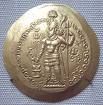


270 On Feb. 14 Father Valentine is allegedly executed by Emperor Claudius II for marrying Roman soldiers without imperial permission, or dies some other way and is buried on Feb. 14 of this year in the Church of St. Praxides, causing 5th cent. Pope Gelasius to combine St. Valentine's Day with Lupercalia. In spring while he is off in Thrace fighting the Goths, Semitic pagan (worshiper of Bel) Queen Zenobia of Palmyra breaks with Roman emperor Claudius Gothicus and sends her gen. Septemius Zabdas (-273) to attack Bostra, capital of the Roman province of Arabia Petraea, defeating and killing Roman gov. Trassus then sacking the city and destroying the temple of Zeus Hammon, shrine of the defeated Legio III Cyrenaica; he then marches S along the Jordan River and easily subdues Judaea and Arabia incl. Petra, tightening Zenobia's grip on Syria with popular support in the capital of Antioch; the short-lived Palmyrene Empire is born (ends 272). In Sept. after plague breaks out among the Goths and spreads to the Romans; Roman emperor (since 268) Claudius II (b. 218) dies of the plague, and his brother Marcus Aurelius Claudius Quintillus (-270) becomes Roman emperor #43, but his soldiers in Sirmium revolt and declare Claudius II's associate Aurelian (Lucius Domitius Aurelianus) (214-75) as Roman emperor #44 (until 275), inheriting an empire facing the sudden loss of many provinces plus major damage done to others; Quintillus is deserted by his troops and defeated, and commits suicide in Sept. after reigning 17 days; Claudius II's associate Gen. Domitianus (-271) is proclaimed rival emperor, but is killed next year. Gen. Posthumus dies, and is succeeded as emperor of Gaul by Gaius Pius Esuvius Tetricus (until 274), who rules from Augusta Treverorum (Trier) near the Rhine River, conquering Aquitania and minting silver antoninianii coins that are later a favorite for counterfeiting by barbarians. Sell your house fast, call Ugh? Despite the recent Vs against the pesky Goths, the Roman frontier begins to break down completely, causing Singidunum (modern-day Belgrade) to find itself on the limes, one of the last remaining major strongholds, causing Aurelian to order new walls constructed in the Po River Valley to defend the formerly open city of Rome for the first time; the 12-mi. 54-ft. Aurelian Wall is built circling Rome to the E, eventually enclosing the Baths of Diocletian on the N, and the Lateran and the Baths of Caracalla on the S, with 14 gates (finished 275) - the neverending pasta bowl? Donald III (-282) becomes king of Scotland. Shapur I's son Hormizd (Hormisdas) I (-271) becomes king (co-king?) of Persia; Mani returns to Ctesiphon and makes many converts, bringing him into conflict with the official Zoroastran religion and priesthood. The first Christian priest is ordained in Seleucia-Ctesiphon. 20-y.-o. Egyptian Christian (St.) Anthony (Antony) the Great (251-356) becomes an ascetic, and in 285 he retires to a mountain across the Nile from Arsinoe (Arsinöe) near Lake Moeris, living in solitude the rest of his life and becoming the first Christian monk; by 300 he begins organizing other monks into communities of hermits (Gr. "of the desert") under his Rule of St. Anthony, and preaches against the Arian heresy; he lives to the age of 100 after 80 years of living alone in the wilderness, becoming patron saint of the poor; the Christian ascetic and Desert Mothers live in the deserts of Israel, Egypt, and Syria until the 5th cent. - I'll take the job? Roman consuls: ? Flavius Antiochianus and ? Virius Orphitus. Births: Roman emperor #56 (308-13) Gaius Galerius Valerius Maximinus Daia (d. 313) on Nov. 20 in Felix Romuliana; son of the half-sister of Galerius; of peasant stock. Greek bishop (St.) Demetrius (Demetrios) of Saloniki (d. 306) (d. 305?) in Thessaloniki; patron saint of Thessaloniki (Thessalonica); feast day: Oct. 26 (Nov. 8 Old Style)/Apr. 9; born in a senatorial family. Christian bishop (St.) Nicholas of Myra (Bari) (d. 346) on Mar. 15 in Patara, Lycia; feast day: May 22 (May 9 Old Style). Anti-Arian bishop Eustathius (the Great) of Antioch (d. 360) in Side, Pamphylia; bishop of Beroea in 320, and patriarch of Antioch by 325. Deaths: Egyptian-born Roman philoospher Plotinus in Campania; leaves The Six Enneads.

271 Felicissimus, chief of the Roman fiscus (fisc) (exchequer) is caught forging coins, starts a revolt, and is killed. Septimius (Septiminius) is proclaimed emperor in Dalmatia, but is killed the next year by his own troops - before the coins can be made? Aurelian defeats the Vandals, Juthungi and Sarmatians in N Italy, and expels the Alamanni from Italy (the last Germanic invasion until 401). Hormizd I is KIA in battle against the Sogdians, and is succeeded as king of Persia by his brother Bahram (Varahran) I (-274). Births: Roman emperor #54 (306-37) Constantine (Gr. "steadfast") I (the Great) (Flavius Valerius Aurelius Constantius) (d. 337) on Feb. 27 in Naissus (Nis, Serbia); son of Constantius I Chlorus (250-306) (a Balkan peasant who worked his way up) and St. Helena (248-329) - no wonder WWI was started by a Serb? Roman consuls: Lucius Domitius Aurelianus Restaurator and Tiberius Pomponius Bassus and (Gaul) Gaius Esuvius Tetricus Senior.

In Apr. after abandoning the trans-Danubian province of Dacia and settling its Roman pop. in a new Dacia carved out of Moesia, with Serdica as capital (in which he builds a mint), earning him the title of restitutor orbis (restorer of the world), Roman emperor Aurelian and his associate Marcus Aurelius Probus cross the Bosphorus to Asia Minor, taking Syrian cities before an expedition reaches Egypt in May, capturing Alexandria in early June followed by the rest of Egypt by the end of June, causing Queen Zenobia of Palmyra to withdraw her armies to Syria, where Aurelian defeats her army in May at the Battle of Immae near Antioch while she waits in Antioch, causing her to retreat with her army to Emesa after parading a fake Aurelian through the streets to spread rumors that he was captured; too bad, the Romans win the decisive Battle of Emesa, defeating her 70K-man army with their 180K-man army, with light losses on the Roman side and heavy ones on the Palmyran side, causing her and her son Vaballathus to flee in haste to the city of Palmyra to make their last stand, leaving the royal treasury behind; after repelling several Roman attacks, Zenobia and her son flee toward Persia to seek Sasanian help, but are captured on the E bank of the Euphrates River and taken back to the emperor, never being heard of again; after the city of Palmyra revolts again, Aurelian sacks it, loots its temples, massacres the pop., and razes the fortifications, reducing it to a slum; the Brucheion (royal quarter) of Alexandria is burned to the ground incl. the section that once contained the Library of Alexandria; the short-lived Palmyrene Empire (founded 270) is kaput; Gen. Zabdas is tried and executed next year, along with Greek Neoplatonic philosopher-rhetorician Gaius Cassius Longinus (b. 213), advisor to Queen Zenobia after she blames her rebellion on his counsel in order to save her own smooth perfumed skin. King Shapur I of Persia dies, leaving his friend Mani swinging in the wind. Roman consuls: ? Quietus and ? Junius Veldumnianus and (Gaul) Gaius Esuvius Tetricus Senior. Births: Spanish martyr (first bishop of Amiens) (St.) Fermin (Firmin) (Firminus) of Amiens (d. 303) in Pamplona, Spain; son of a Roman of senatorial rank who was converted to Christianity by St. Honestus, a disciple of St. Saturninus; feast day: Sept. 25 (July 7 in Pamplona). Roman Christian bishop of Beneventum (St.) Januarius (San Gennaro) (d. 305). Deaths: Persian king (since 241) Shapur I.

273 The 263rd Olympiad. Roman emperor Aurelian defeats the Carpi in the Danube region, and resettles them, then suppresses a new revolt of the Palmyrenes under Apsaeus, sacking Palmyra, then suppresses the revolt of Firmus in Egypt, then celebrates a triumph in Rome. Tetricus I raises his son Tetricus II to Caesar (until 274). Roman consuls: Marcus Claudius Tacitus and ? Julius Placidianus.

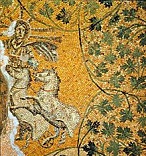

274 In Feb.-Mar. Roman Emperor Aurelian defeats pretenders Tetricus I and Tetricus II at the Battle of Chalons-sur-Marne in Gaul, sparing their lives and setting daddy up as gov. of S Italy, and reintegrates Gallia (Gaul) and Britannia (Britain) into the Roman Empire, then celebrates a 2nd triumph in Rome, adorned by his trophies Zenobia and Tetricus; on Dec. 25 he orders the cult of Sol Invictus (Lat. "Unconquered Sun") made official, and inaugurates the Temple of Sol Invictus in Rome; all emperors go on to celebrate his birthday until Constantine, who goes Christian, after which the cult lasts until the 5th cent.; the last inscription referring to Sol Invictus is made in 387; Aurelian establishes trust in the monetary system, single-handedly restoring the Roman Empire while making Dec. 25 a commercial holiday, giving the Christians a burning desire to steal the day for their Son-god's b-day?; or did the pagans steal it from them? On Dec. 30 Felix I dies. Bahram I dies, and his son Bahram (Varahan) II (-293) becomes king of Persia. Roman consuls: Lucius Domitius Aurelianus Restaurator and ? Capitolinus and (Gaul) Gaius Esuvius Tetricus Senior.


275 On Jan. 4 (St.) Eutychian(us) (-283) is elected bishop of Rome (pope #27). In Sept. after suppressing revolts in Gaul, fighting invading barbarians in Vindelicia in S Germany, and marching to fight the Persians, Roman emperor (since 270) Aurelian (b. 214) is assassinated in Caenophrurium in SE Thrace en route to Byzantium after a plot by corrupt officials he was trying to purge turns the Praetorian Guard against him; coincidentally or not, he was about to begin a persecution of the Christians, which never happens; on Sept. 25 former consul (273) Marcus Claudius Tacitus (200-76) is appointed Roman emperor #45 (until 276) against his will by the swash, er, buckling Senate; meanwhile what's left of Dacia collapses after the distraction of its defenses to Moesia and Thrace. Kanishka III dies, and Vaskushana (-290) becomes king of Kushan (until 290). The Pallava Dynasty (ends 897 C.E.) is founded on the ruins of the 1st cent. B.C.E. Satavahana Dynasty by former feudatories. Himyarite king Yasir Yuhan'am I (-285) of Yemen conquers and absorbs the Kingdom of Saba, the combined empire lasting until 577. Egypt begins experiencing rampant currency inflation. Roman consuls: Lucius Domitius Aurelianus Restaurator and ? Marcellinus. Births: Roman Christian soldier (of dragon fame) St. George (d. 303) (b. 281?) in Lydda, Syria Palestina; Armenian Cappadocian father, Jewish mother (from Lydda, Palestine); patron saint of England, Greece, Russia, Ethiopia, Portugal et al.; feast day: Apr. 23. Deaths: Roman emperor #44 (270-5) Aurelian (b. 214) in Sept. in Caenophrurium (asssassinated).
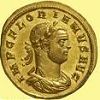

276 In the spring after the Goths, Alans, and Heruli, who had been gathered by Aurelian for his Eastern campaign mutiny at the news of his death and begin plundering Asia Minor, Roman emperor (since 275) Tacitus (b. 200) defeats them, gaining the title of Gothicus Maximus, but he dies in June in Cappadocia, and his half-brother, Praetorian prefect Marcus Annius Florianus (-276) assumes the purple as Roman emperor #46, but rival Marcus Aurelius Equitius Probus (232-82) (an Illyrian), is proclaimed Roman emperor #47 by the Eastern armies (until 282), and after reigning 88 days Florid Anus is murdered by his own troops near Tarsus when they see how Big Probe's force is and how hot the heat is (didn't I see that porno flick?) (a prophesy is circulated that Florianus' descendant will one day restore the Roman Senate and rule as far as Ceylon?); Probus then goes to Rome to be confirmed by the Senate and hunt down and execute the murderers of his benefactor Aurelian; meanwhile the Goths raid Pontus, and are forced by Probus along with the Franks and Alamanni back over the Rhine after doing a lot of damage. Roman consuls: Marcus Claudius Tacitus and Aemilianus. Deaths: Roman emperor #45 (275-6) Marcus Claudius Tacitus (b. 200) in June in Tyana, Cappadocia (fever?) (assassinated?).
277 The 264th Olympiad. Roman emperor Probus campaigns against the Franks, Longiones, Burgundians, and Vandals, and defeats them all despite being outnumbered, capturing Longiones chief Semnon, and making him agree to conditions before allowing his people to return to their homeland; at one point 16 German chiefs kneel at Probus' feet, and after hostages are taken to assure their peacefulness, they are allowed to return, while 16K Germans are recruited into the Roman army; Probus reorganizes the defenses on the Rhine River. Burdigalia, capital of Aquitania in SW France is sacked by barbarians invading Gaul from the N, after which pirates set up shop in the Gironde River estuary. After he funs afoul of Zoroastrian priest Kartir, Persian king Bahram II has Mani crucified and his body flayed, and a fierce persecution of Manichaeism begins. Roman consuls: Marcus Aurelius Probus and Paulinus. Births: Iberian (Kartli) king #22 (284-361) (first Christian) (founder of the Chosroid Dynasty) Mirian III (d. 361); son of Aspacures (Aspagur) I (-284). Deaths: Persian Manichaeism founder Mani (b. 216) (crucified).
278 Roman emperor Probus defeats an invasion by the Vandals. Roman consuls: Marcus Aurelius Probus and Virius Lupus.
279 Roman emperor Probus repels an invasion of the Getae across the Lower Danube, then heads to Syria to quell rebel Moorish gov. Julius Saturninus, and has him assassinated, then successfully sieges his mountain fortress in Cremna, Isauria; after deciding that the Persians are too tough, he signs a truce with Bahram II. Tiridates II's son Chosroes (Khosrov) I (-287) becomes ruler of W Armenia. Jin Wu Di attacks the kingdom of Wu. Roman consuls: Marcus Aurelius Probus and Nonius Paternus.
280 Roman emperor Probus settles 100K Scythians of the Bastarnae tribe in Thrace, then heads W to deal with new self-proclaimed emperors Proculus (-281) (cmdr. of Gaul) and Bonosus (-281) (cmdr. of Germany, born in Spain to a British father and Gaullish mother), who are both defeated and killed next year (Bonosus by suicide); another rebel cmdr. in Britain is dealt with by Mauretanian cmdr. Victorinus. Emperor Wu destroys the Eastern Wu kingdom, unifying all of Wu, and ending the Three Kingdoms Period (begun 220), going on to prove his potency with 10K concubines. Roman consuls: ? Messala and ? Gratus - the last record of any Messala in Rome? Births: Roman Christian philosopher ("the Augustine before Augustine") Gaius (Caius) Marius Favus Victorinus (Afer) (d. 365) in Africa.
281 The 265th Olympiad. Late in the year Roman emperor Probus holds a triumph in Rome. Nonfiction: The Bamboo (Ji Tomb) Annals are found in the grave of a Chinese prince, telling about Emperor Yao, who named the 12 signs of the Chinese Zodiac and divided the sky into 28 mansions of the Moon. Roman consuls: Marcus Aurelius Probus and Gaius Junius Tiberianus.

282 You know the rules but don't care? In the spring after strengthening the Danube frontier, quieting Asia Minor, and suppressing pretenders in Gaul, Probus heads for Sirmium on the Danube River to prepare a campaign against the Persians, whom he think he can now take on; too bad, his troops in Rhaetia and Noricum on the Upper Danube balk at being made to do civil engineering and agricultural work to repair the damage to the empire, and in Sept. proclaim Praetorian prefect Marcus Aurelius Carus (230-83) (an Illyrian?) as Roman emperor #48 (until 283), and in late Sept. Roman emperor (since 276) Probus (b. 232) is murdered by his own troops near Sirmium; carefree Carus tells the happy troops to quit planting vines and begins a successful campaign against Persian Shah Bahram (Varahan) II, causing him to abort his Eastern campaign against the Sakae. Crathilinthus (-304) becomes king of Scotland. Roman consuls: Marcus Aurelius Probus and ? Victorinus. Deaths: Roman emperor #47 (276-82) Probus (b. 232) in late Sept. near Sirmium (murdered).



283 In July-Aug. after starting the Fourth Roman-Persian War and conquering Mesopotamia and taking Ctesiphon, Roman emperor (since 282) Carus (b. 230) dies mysteriously beyond the Tigris River one day after a violent storm (hit by lightning?), ending the Persian campaign, and his son and co-Augustus Numerian (Marcus Aurelius Numerius Numerianus) (-284) becomes Roman emperor #49 of the East (until 284), while his other son and co-Augustus Marcus Aurelius Carinus (-285) becomes Roman emperor #50 of the West (until 285). On Dec. 7 Eutychianus dies, and on Dec. 17 (St.) Caius (Gaius) (-296) is elected bishop of Rome (pope #28). Roman consuls: Marcus Aurelius Carus and Marcus Aurelius Carinus. Births: Italian anti-Arian Catholic bishop Eusebius of Vercelli (d. 371) in Sardinia. Deaths: Roman emperor #45 Carus (b. 230) in July-Aug. in Mesopotamia.

284 In the fall after ambitious Flavius Constantius Chlorus backs Diocletian in a coup, Roman emperor (since 283) Numerian is murdered, and the Eastern army proclaims Diocletian (Gaius Aurelius Valerius Diocletianus) (Diocles) (244-312), cmdr. of the imperial bodyguard (since 283) and former Dux Moesiae (cmdr. of the Lower Danube) (an Illyrian of low birth), who in Nov. becomes Roman emperor #51 (until 313), ruling from Nicomedia in Bithynia (Asia Minor), adopting the pomp and ceremony of the Persian court, insisting on being called dominus (lord), with everything surrounding him deemed sacred, and dressing in purple and gold robes with jeweled slippers and a diadem on his head, while subjects prostrate themselves in his august presence; of course he persecutes the pesky Christus-only Christians; the Imperial Crisis of the Third Cent. (begun 235) ends; the imperial court (comitatus) incl. a domestic staff headed by a eunuch, a magister memoriae (master of records) and other officials supervised by the magister officiorum; the imperial guard (scholae) furnishes 40 hand-picked candidati (white uniforms) for the emperor's bodyguard; the officer training corps (protectores) furnishes new high officials - shove that old slum Rome? King (since 265) Aspacures (Aspagur) I dies in exile in Alania, and his daughter Abeshura's husband Mirian II (277-361) becomes king #22 of Iberia (Kartli) in Georgia, becoming the first Christian king of Iberia, founding the Chosroid Dynasty. The 2nd Roman Embassy to China is sent by Emperor Diocletian (first 166). Roman consuls: Marcus Aurelius Carinus and Marcus Aurelius Numerius Numerianus. Deaths: Greek mathematician Diophantus of Alexandria (b. 200); leaves Arithmetica, founding the study of Diophantine equations.
285 The 266th Olympiad. In May Diocletian defeats Carinus at the Battle of the Margus River in Moesia (Moravia), and he is murdered by his own troops. Papa bar Gaggai (Haggai) (-327) is ordained as the first Christian bishop of Seleucia-Ctesiphon in Persia. Roman consuls: Marcus Aurelius Carinus and Titus Claudius Marcus Aurelius Aristobulus.
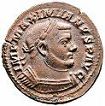

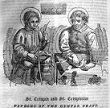
286 After determining that it is too large for one man to run, Diocletian partitions the Roman Empire, choosing as his colleague the Illyrian Maximian (Marcus Aurelius Valerius Maximianus) (250-310) as Caesar of the West (Roman emperor #52); Maximian is then kept from being made jealous by being elevated to Augustus on Apr. 1 (until May 1, 305), ruling from Mediolanum (Milan), while Diocletian assumes the title Jovius, and Maximian the title Herculius - Happy and Well-Hung? The Bagaudae (vagrant rebel German pirates) under Amandus and Aelianus are defeated by Maximian in Gaul with the help of Roman fleet cmdr. (based in Gessoriacum, modern-day Boulogne) Mausaeus Carausius (Carasius) (-293) (a German), who is caught stealing their spoil, hears of a death warrant out on him, lets it go to his head, and seizes Britain, declaring himself Augustus, hoping for help from Germans settled in England, and severs Britain from the Roman Empire for seven years. Roman consuls: Marcus Junius Maximus and ? Vettius Aquilinus. Deaths: Roman Christian martyrs St. Crispin and St. Crispinian (Crispian), brothers of a noble Roman family who fled the Diocletian persecution in 284, arrived in Suessiona (Soissons) in Gaul, and took up the lowly trade of shoemaking while continuing missionary work, end up getting beheaded at the order of co-emperor Maximian, becoming the patron saints of shoemakers; feast day: Oct. 25 - do they wash their customers' feet too?


287 Chosroes I is murdered by Parthian agent Anak (father of St. Gregory the Illuminator) under orders of Ardashir I, and his infant son Tiridates IV (III) (the Great) (d. 339) is spirited to Rome under the sponsorship of Diocletian, and groomed for the throne of W Armenia with a Roman education; he later makes a comeback, although remaining a pagan until 300. Diocletian tries to stomp some cockroaches in his kitchen, but never gets near the nests behind the walls? Roman soldier Maurice and several thousand others are martyred by Maximian for refusing to kill fellow Christians who are civilians; he allegedly carries the Spear of Cassius Longinus that was used on Christ; pagan-turned-Christian (St.) Pelagia (Margarito) of Tarsus (feast day: Oct. 8) is allegedly burned alive in a brass Sicilian Bull (either that, or she leaps off a roof to avoid being raped) by Diocletian; pagan senator's son (St.) Vitus, a child who was converted by his nurse Crescentia and his tutor Modestus is martyred in Lucania (Rome?), becoming one of the Fourteen Holy Helpers, a group of early martyrs venerated in Medieval Germany, which become the patron saints of comedians and those suffering from certain diseases, esp. St. Vitus' Dance; the feasts of St. Vitus, St. Crescentia, and St. Modestus are celebrated on June 15 - with choleric dancing and comedians? Roman consuls: Gaius Aurelius Valerius Diocletianus Jovius and Marcus Aurelius Valerius Maximianus Herculius.
288 Roman emperor Maximian goes to Britain to oust Carausius. Roman consuls: Marcus Aurelius Valerius Maximianus Herculius and ? Pomponius Januarianus.
289 The 267th Olympiad. Roman consuls: Lucius Ragonius Quintianus and Marcus Magrius Bassus.

290 Vaskushana dies, and Vasudeva II (-300) becomes king of Kushan. Jin Wu Di dies, and his retarded son Jin Hui Di (259-307) becomes Xi Jin emperor #2 of China (until Jan. 8, 307). The kingdom of Saba in S Arabia conquers the Kingdom of Kindah in C and N Arabia. Bahram II begins a brief persecution of Christians. Late in this cent. Aleppo (Alep) (Beroea) in N Syria on the Kuwaik River halfway between the Mediterranean Sea and Euphrates River becomes the #1 trading center of Europe and the Orient; its port is Iskenderon; the Tomb of Zacharias, father of John the Baptist is located there. Roman consuls: Gaius Aurelius Valerius Diocletianus Jovius and Marcus Aurelius Valerius Maximianus Herculius. Births: Greek mathematician Pappus of Alexandria (d. 350).
291 The pop. of Dubhlinn (Dublin) (Gael. "black pool") (formerly Eblana) in Ireland win a military V over the armed forces of Leinster. The Rebellion of the Eight Kings The earliest recorded date on a Mayan Stella (#29 in Tikal). Roman consuls: Gaius Junius Tiberianus and ? Cassius Dion. Births: Roman Catholic virgin martyr (St.) Agnes (Lat. "chaste") (d. 304); feast day: Jan. 21 - did I mention she's a virgin?
292 Roman consuls: ? Afranius Hannibalianus and ? Julius Asclepiodotus.




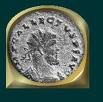
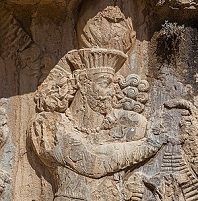
293 The 268th Olympiad. Diocletian attempts to reform the admin. of the empire, dividing it into E and W parts, each with two prefectures or divisions (Gaul and Italy in the W, Illyricum and the East in the E), each with its own praetorian prefect, further divided into several dioceses under vicars (vicarii); he appoints Serbian-born Constantius I Chlorus (the Pale) (Flavius Valerius Constantius Chlorus) (250-306) (father of Constantine I the Great) as 2nd Caesar of the West, and Galerius (Gaius Galerius Valerius Maximianus) (250-311) as 2nd Caesar of the East, beginning the Roman Tetrarchy; both Caesars have to marry one of Diocletian's daughters, and Constantius I has to divorce his sure-to-get-gas wife (St.) Helena (248-329) (alleging non-patrician origin) before marrying candy-pants Theodora Augusta; Galerius governs most of the Balkan provinces, while Constantius governs Gaul, immediately going after Carausius and driving him back to Britain, where he is murdered by his minister Alectus (-296), who dons his purple - give it to me momma? Bahram II dies, and his son Bahram (Wahram) (Warahan) (Varahan) III becomes Sassanian shah #6 of Persia, but in a few mo. is deposed by his uncle Narses (Narseh) (Narseus)(-303), who becomes Sassanian shah #7 of Persia (until 303), fighting with his brother and rival Hormizd, keeping him from the throne; Tiridates III/IV the Great becomes a Persian vassal. Diocletian lays the foundation for the Later or Byzantine (quadripartite) Roman Empire, increasing the number of provinces to 116, grouped into dioceses under the control of vicars, and dividing the empire into four admin. prefectures, each under a praetorian prefect, who is asst. to one of the two Augusti and two Caesars (East and West); sick of provincial cmdrs. turning pretender, Diocletian for the first time separates the military and civil power; the army is reorganized into limitanei who garrison the frontiers, and mobile limitanei grouped around the Augusti and Caesars; meanwhile disorder continues, prices rise, taxes are high, and people shirk army duty - like the U.S. in the 1960s-70s? Roman consuls: Gaius Aurelius Valerius Diocletianus Jovius and Marcus Aurelius Valerius Maximianus Herculius.
294 Roman consuls: Gaius Flavius Valerius Constantius Chlorus and Gaius Galerius Valerius Maximianus. Births: Egyptian ascetic monk St. Amun (Ammon) (Ammonas) (Amoun) (Ammonius the Hermit) (d. 357) in Mariotis; named after Egyptian god Amun, don't ask?; persuades his wife to swear a vow of chastity on their wedding night, and lives with her for 18 years without doing the wild thing, then heads for the Nitrian Desert to become a monk while she founds a convent.
295 Galerius clears "immense forests" in Pannonia for defensive purposes. The 150-mi. German frontier is held by 400K Romans, who defeat a horde of invading Germans. Latin Christian apologist Arnobius of Sicca (-330) flourishes in Numidia, N Africa about this time, along with his pupil Lactantius (240-320); while a teacher of rhetoric at Sicca, Numidia, Arnobius pub. Adversus Gentes to refute charges that Christianity is causing all of the Roman Empire's problems. Architecture: Diocletian begins Diocletian's Palace, a massive walled retirement palace 4 mi. from his birthplace, the Dalmatian capital of Salona in modern-day Split, Croatia (named after the original Greek colony of Aspalathos, which in Latin is Spalatum) on the Bay of Aspalathos; it is lost until Scottish architect Robert Adam (1728-92) and his draftsman Charles-Louis Clerisseau (1721-1820) pub. a treatise on it in London in 1764; it is excavated in 1956. Roman consuls: ? Nummius Tuscus and Gaius Annius Anullinus.


296 On Apr. 22 Caius dies, and on June 30 (St.) Marcellinus (d. 304) is elected bishop of Rome (pope #29) - not a fun job at this time? Alectus is defeated and killed by Emperor Constantius, and Roman rule of Britain is restored. Egypt revolts under Aurelius Achilleus, and Lucius Domitius Domitianus (-297) is proclaimed emperor. Narses of Persia drives the pro-Roman king Tiridates III/IV the Great from Armenia, starting the Fifth Roman-Persian War (ends 297). The Picts naked blue-painted Celtic people of Britain are first mentioned in Roman lit. - good morning, Tiger? Births: Alexandrian archbishop (patriarch) (328-73) Athanasius (the Great) (d. 373) in Alexandria, Egypt; feast day: May 2; champion of the Trinity, foe of Arius, and the winner and still champeen in the Catholic Church?; "Athanasius contra mundum". Roman consuls: Gaius Aurelius Valerius Diocletianus Jovius and Gaius Flavius Valerius Constantius Chlorus.
297 The 269th Olympiad. Early in the year Diocletian quashes the Egyptian revolt and kills pretender Domitianus. The Romans under Gallerius invade Persia to restore Tiridates III/IV the Great, but are defeated near Carrhae, and Narses invades Mesopotamia, but is defeated and forced to sign a peace with Rome ceding the territory W of the Tigris River, ending the Fifth Roman-Persian War (begun 296); St. Gregory the Illuminator, son of Chosrov I's assassin Anak, who had been imprisoned in a starvation pit for 12-14 years on the Ararat Plain under the modern-day Church of Khor Virap near Artashat is released to help restore insane Tiridates III/IV to sanity, and goes on to work on his paganism habit too. Roman consuls: Marcus Aurelius Valerius Maximianus Herculius and Gaius Galerius Valerius Maximianus.
298 Galerius returns and crushes the Persians, causing them to conclude a peace treaty giving up Mesopotamia and other territories E of the Tigris River; the W part of Media is ceded to Armenia, which becomes a Roman protectorate and buffer; the peace lasts 40 years. Constantius returns to Gaul and defeats the Alamanni. The Romans recapture revolving-door Nisibis. Roman consuls: Marcus Junius Cesonius Nicomachus Anicius Faustus Paulinus and ? Virius Gallus.
299 There is no record of widespread Millennium Fever this year? - people just lay around picking their noses? Emperor Constantius issues a decree providing for execution of anyone caught with a finger in their nose deeper than the first joint - just how big are Roman noses? Roman consuls: Gaius Aurelius Valerius Diocletianus Jovius and Marcus Aurelius Valerius Maximianus Herculius. Deaths: Babylonian Jewish rabbi Judah bar Ezekiel (b. 220) in Pumbedita.